#Ceremonial Guard Sentry
Text
Fantasy Guide to Royal Guards

Royals have multiple layers of servants but there is no set of servants most important that their protection. Royalty are never without some kind of protection and palaces are usually guarded to the teeth. So how do we write royal security. This is for @jamie-ties-writing
Recruitment
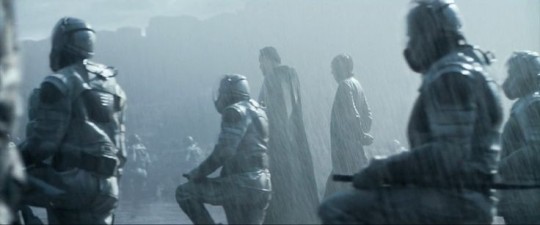
Royal guards aren't just any person plucked from the street and put into a uniform. They are usually recruited from within the royal army, from within particular regiments across the army (a mixture of calvary, naval, artillery, infantry). The Royal Guard is usually made of of multiple regiments, not just a single one. These regiments would share and rotate duties. The British Royal family are currently guarded by the Coldstream Regiment, Welsh Guards, Grenadier Guards among others. Royal guards will be selected for their skill, sometimes their birth (they may be chosen if they rank higher socially) and of course, loyalty to the Crown. Royal guards were intended to be a show of force, strength, Majesty so they were usually impressive specimens meant to instill some power to their monarch.
Duties
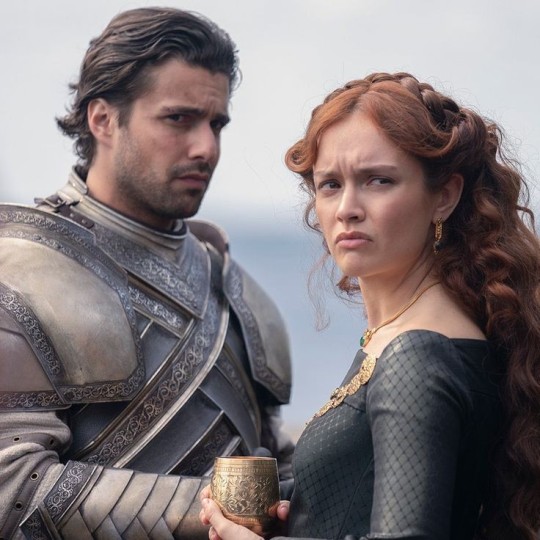
A royal guard's first order of business is the protection of the family. They may have sentry duty around the palace, guarding doors or patrolling palace grounds or corridors. A Royal Guard may be assigned to one member only but most likely they will rotate through the family as needed. Of course, a royal can request a guard to always be assigned to them if they want. They may escort their charge of the day to their engagements. If assigned a certain royal to protect, they would tail them throughout the day. A royal guard may even perform ceremonial duties such as the changing of the guard or riding in coronations or state funerals. A royal guard is expected to remain vigilant but never speak of what they see, they are meant to keep an ear out for threats but never repeat whatever is said, they are expected at all times to uphold a professional countenance and respect protocol. They will be expected to give their lives if needed, and be loyal to the last.
Rank
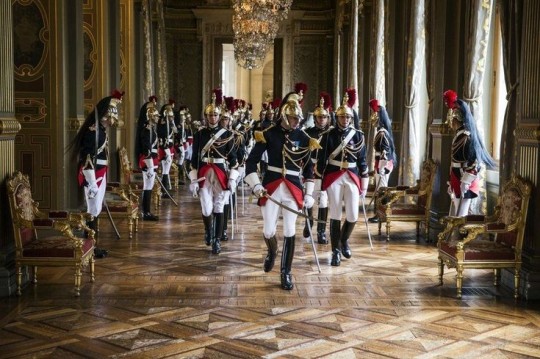
Royal guards are a military division and rank is a part of their lives. Their supreme commander would he the monarch first but there would be an appointed commander. Depending on how you want to write Royal Guards, each regiment would have it's own captain and leaders. Of course, not all regiments may adhere to the same ranks but this would be a basic outline for you to follow.
Colonel: Colonels actually have no duties, they are more an honourary figurehead. Many members of the royal family would have a regiment to be colonel of. This usually requires nothing more than a ceremonial role, the wearing of the uniform while inspecting the troops for example.
Captain: The Commander of the regiment. They would undertake managerial duties, issuing commands from the monarch, assigning duties, approving the induction of new guards into the Household Division. The Captain would decide who would guard which member of the royal family.
Lieutenant: The Second in command. They will assume command if the Captain is not available. They would take on a large portion of duties and aid the Captain.
Sergeant: The sergeant would be next in command.
Guardsman: The lowest rank. They will have the least experience but usually the most duties. They would be the ones patrolling and standing sentry.
Uniform

Of course, no royal guard is complete without their uniform. Royal guards would have to stand out, especially in ceremonial duties. This uniform would be distinctive, not only because it is a great honour for anybody to be named to the guard but also as mentioned above, to add a layer of might to those they protect.
Notable Royal Guard Units
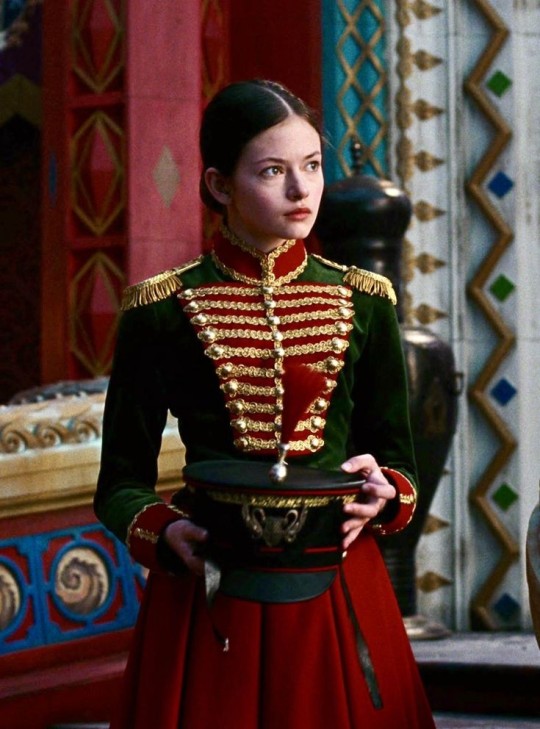
Dahomey Mino (the inspiration of Black Panther's Dora Milaje)
The Praetorian Guard
The Imperial Guard of Napoleon
The Imperial German Bodyguard
Varangian Guard
Swiss Guards
The Kheshig
The Janissary
The Imperial Guards of Tsarist Russia
The Cossack Guard
Guardia Real
Coldstream Guards
Irish Guards
Welsh Guards
Grenadier Guards
Medjay of Ancient Egypt
Al-Ḥars al-Malakī as-Suʿūdī
Compagnie des Carabiniers du Prince
Thahan Raksa Phra Ong
#Fantasy Guide to Royal guards#Royal guards#Royals#Royalty guide#Fantasy Guide#Writing reference#Writing resources#Writing advice#Writing resources writing reference#writing#writeblr#writing resources#writing reference#writing advice#writer#ask answered questions#spilled words#ask answered#writers
1K notes
·
View notes
Note
What is the closest military base to the white house?
The White House IS a military installation.
It is the home and workplace of the Commander-in-Chief of United States military forces, so that alone makes it an important command and control headquarters. The various branches of the military have an active role in the everyday logistics of running the White House campus and supporting the Executive Office of the President. The White House's complex and extensive communications agency is staffed by members of each individual branch of the military. The U.S. Navy is responsible for the White House Mess and providing food services to the President, the First Family, any potential guests, and the President's staff. The White House Medical Unit is staffed by military doctors who have a round-the-clock presence in the White House and the official Physician to the President is usually an active-duty military officer.
While the Secret Service -- which includes the traditional plainclothes agents and the more visible uniformed division -- is responsible for protecting the President, his family, and the White House itself, the military also has a protective footprint in and around the White House complex. It's believed that amongst the White House's protective measures -- most of which are highly classified -- are anti-aircraft defenses, which are almost certainly manned by the military rather than the Secret Service. Marine Corps guards also are stationed at the White House (often seen opening and closing doors while manning the entry and exit points around the West Wing) as sentries and sometimes act as military valets during events hosted by the President in the White House. The role of the Marine sentries is purely ceremonial as opposed to protective.
And one of the most important White House responsibilities of the military is transportation. The White House Transportation Agency is responsible for all aspects of the President's travel, and the military works in tandem with the Secret Service on planning and carrying out the immense logistical challenges of transporting the President anywhere in the world -- a challenge magnified by the sheer size of Presidential traveling parties. A Presidential motorcade consists of, on average, 50-60 vehicles. And the majority of those vehicles actually have to be transported from the United States to wherever the President is traveling -- even if it is to several different foreign countries or continents. The Air Force is, obviously, responsible for the President's plane, along with any other aircraft making the trip which are usually carrying White House staff, members of the press, or cargo. For short distances that can be made by helicopter, the Marine Corps takes the lead. And any ground travel by motor vehicles is handled by the Army.
Security and the President's personal protective detail is always led by the Secret Service, but the military is responsible for many of the day-to-day logistics of the institution of the Presidency, which illustrates why the White House is an important military command and control base.
#White House#Presidency#Commander-in-Chief#U.S. Military#Military Bases#Military Installations#Command and Control#White House Communications Agency#Communications#White House History#Military History#U.S. Army#U.S. Air Force#U.S. Marine Corps#U.S. Navy#White House Mess#White House Transportation Agency#White House Sentries#U.S. Secret Service#Secret Service#Presidential History#History#Presidential Motorcade#Air Force One#Marine One#The Beast#Executive Office of the President#Presidents
25 notes
·
View notes
Text
lovely and lonely, Tamlin/Lucien, Chapter 8
Chapters: 8/?
Fandom: A Court of Thorns and Roses Series - Sarah J. Maas
Rating: Mature
Relationships: Tamlin/Lucien Vanserra
It was the first Autumn Equinox since Lucien had left home. Of course, in Spring, the equinox was not the major ceremonial occasion that it had been in Autumn. It was merely an excuse to invite the court to come together and feast. Here, Lucien didn’t have to slink away from the main event to drink in private with a few friends. Everyone danced and ate together in a huge field, regardless of their social status.
Lucien sat around one of the bonfires with some of the other sentries that lived at the manor with Tamlin. Upon his assimilation into Spring he had almost immediately befriended Andras, a gentle giant that served as the captain of the guard. Andras had brought a blanket to lay on the grass, and he sat upright, steady as a statue, enough that Lucien could comfortable lean against him as he drank. Also around the fire were two more males, Veer and Dion, and a female, Zahra. There weren’t many females that worked as guards for Tamlin, but Zahra was formidable enough that Lucien never questioned it. She had a similar height and build to Andras, with none of his mellow attitude.
“Thank the Cauldron that Tamlin was able to patch things up with Summer,” Veer commented, popping one of the small brown fruits on Dion’s plate into his mouth. “I’ve missed these figs.”
“You mean that I was able to patch things up,” Lucien corrected. At the mention of Tamlin, he glanced around, noting that the High Lord was absent. “Where is our fearless leader anyway?”
(Continue reading on AO3)(start at the beginning)
#acotar#a court of thorns and roses#tamlin#lucien#lucien vanserra#pro tamlin#pro lucien#tamcien#tamlin/lucien#tamlin/lucien vanserra#fanfic#my fic#MORE HOMOSEXUAL ANTICS
15 notes
·
View notes
Text
This short story is presented as the dream of a character in an Amitav Ghosh short story that I encountered for the second time today in a collection that I was reading. The story is called “The Ascent of the Anthropoi.”
As a story it’s sort of not to my taste, but as a parable I find it striking.
In my dream I was a young girl, growing up in a valley that was home to a cluster of warring villages, high in the Himalaya. Overlooking our Valley was an immense, snowy mountain, whose peak was almost always wreathed in clouds. The mountain was called Mahaparbat, Great Mountain, and despite our differences all of us who lived in the Valley revered that mountain: our ancestors had told us that of all the world’s mountains ours was the most alive; that it would protect us, and look after us – but only on condition that we told stories about it, and sang about it, and danced for it – but always from a distance. For one of the binding laws of the Valley, respected by all our warring villages, was that we were never, on any account, to set foot on the slopes of the Great Mountain.
We heeded our ancestors and kept away from this mountain: we knew in our hearts that our mountain was a living being that cared for us; we saw proof of this every day, all around us, in the form of a tree that grew along the streams that descended from its slopes. This tree, which grew only in our Valley and nowhere else, produced things that were so miraculous that we called it the Magic Tree. Its leaves kept insects away; its wood was impermeable to water; its roots nourished rare mush- rooms; its flowers produced exquisitely scented honey; and its fruit was delicious to eat. But the most miraculous thing of all was the nut that lay within the fruit: its fragrance was incomparable, and it had so many medicinal uses that traders from the Lowlands would travel long distances in search for it.
Even though we Valley People fought over many things, we were all in agreement on one matter: strangers would never be allowed to enter our Valley. So those who came in search of our goods had to wait at a mountain pass that was defended by a great portcullis. There once every year, when the snows retreated, our Eldermen and Elderwomen would go to meet the visiting merchants. In that one week our Elderpeople would acquire all the trade goods that we needed, in exchange for the gifts of our Mountain – the miraculous nuts, rare mushrooms, fine honey, herbs, and the like. At the end of Trading Week, as it was known, the Elderpeople would see to it that all the visitors had departed, after which they would post a squad of sentries to guard the portcullis for the rest of the year. Then they would return to their homes, and each village in the Valley would host a ceremony of gratitude, to thank the Great Mountain. When the prayers had been chanted, and the offerings made, the whole Valley would feast and dance: for us, that was the happiest day of the year.
Life in our Valley was not easy – we had to work hard for our food, and when we were not doing that, we were fighting with our neighbours. But we knew no other life and we were content with what we had. And why would we not be? We loved to listen to stories about our Great Mountain and our amazing trees; we loved to sing our songs, and we loved, most of all, to dance. Our dances were always led by women, and the most skilled of them were known as Adepts; sometimes, when dancing they would go into a trance, and afterwards they would tell us that they had felt the mountain speaking to them, through the soles of their feet.
Oh, how we envied our Adepts!
So things went on, as ever they had, until one year when the Elderpeople returned from Trading Week with solemn, troubled faces. They told us that a stranger of a new kind had come to the pass that year, from a land very far away. His people, he said, were called the Anthropoi; their savants had heard about our nuts and he had been sent on a mission to learn about our Valley, and all that it contained.
The Elderpeople showed him their wares – mushrooms and herbs, nuts and honey – but that was not enough for the stranger: he wanted to come into the Valley and see it with his own eyes.
This was impossible, the Elderpeople told him; it was against the Law of the Valley; the Great Mountain did not wish it. This displeased the stranger mightily, but he smiled and said: ‘Since I can’t enter your Valley, I must learn about it from you. Tell me about your Valley and about all the other valuable trade goods that it produces.’
‘The most important thing in our Valley,’ the Elderpeople told him, ‘is something that cannot be traded – our living mountain, Mahaparbat.’ ‘Oh really?’ said the stranger, ‘Tell me about your mountain then.’ So our elders told him about our beloved Mahaparbat, and the wonderful streams that were fed by its snows. The stranger listened with great care, and wrote everything down, so diligently that some of our elders began to worry about his intentions. It was a great relief to them when, at the end of the week, he left with all the Lowland people. Although he went quietly enough, his last words had an ominous ring: ‘I am sure we will see each other again.’
A year passed, and then another, and there was no sign of the stranger, which was a matter of no little satisfaction for the Elders. But then suddenly one morning the Great Mountain began to shake and heave; avalanches came roaring down its slopes and rifts opened up in the Valley.
Terror-struck, everyone turned to the Adepts: ‘What is happening? What is our Mahaparbat telling us?’
The Adepts put their ears, and their feet, to the ground and listened as they had never listened before. Then they turned to us, ashen-faced: ‘A cycle of time has ended,’ they said, ‘and another one has begun: the Cycle of Tribulation. Strangers are coming from afar, a horde of them, armed with terrible weapons. . .’
Sure enough, not long after, a lone sentry came racing down from the mountain pass: an army of Anthropoi had arrived, he said. They were not many in number but they had very powerful weapons and were skilled in the art of war. They had stormed the portcullis and taken all the sentries captive. He alone had been set free, to bring a message to the Valley, to let us know that the Anthropoi had decided to conquer the Great Mountain! Their savants had studied all that was told to their envoy, and they were convinced that unbeknownst to us, great riches – minerals, metals and the like – were hidden within the mountain. We were unaware of this because we were a credulous and benighted people, who believed that our Mountain was alive. The savants of the Anthropoi were unmatched in their wisdom, and they had decided that since we were not making use of the Mountain’s riches, they were fully justified in seizing them and taking whatever they wished.
A stunned silence spread through the Valley. ‘Impossible,’ we said, with one voice. ‘We can’t let them do that.’
‘If we try to stop them,’ said the sentry, ‘they say they will fight us. We have no choice, they say, but to let them climb and conquer the Great Mountain. Not only that, we must help them do it, or else they will kill or enslave us.’
Of course such an ultimatum could not be accepted. It was decided that we would fight, and so we did, all of us, men and women, young and old. We fought valiantly, but our efforts were unavailing – some of our villages were defeated in battle, some were tricked into attacking their neighbours, and others were reduced to quiescence with drugs that sent them into dream-like trances.
Once we had been subjugated, the Anthropoi herded us together and told us that from now on we would be ruled by some of their most ferocious soldiers – they called them Kraani, or the ‘Helmeted Ones’. They were to be our guards and overseers, to make sure that we did all the work that had been assigned to us. They were small in number, the Kraani, but they made up for this by conjuring up terrifying illusions of omnipotence – they created such a distance between themselves and us that we came to accept that the Anthropoi were not like us, that they were a different species of being.
The first thing the Kraani did was to dismiss all our old Elderpeople and appoint new ones, whom they chose themselves. In the past, amongst our Elders, there had been women as well as men, but no more. The new ones were all men, and we soon learned to fear these Eldermen almost as much as we feared the Kraani.
Next they imprisoned our Adepts, and forbade all our ceremonies and songs, stories and dances. They were all worthless, they said; our ancestral lore, they said, had brought nothing but doom upon us, which was why we were now reduced to this state of degradation and despair.
Our state was indeed as terrible as it could be, yet we soon noticed that the Anthropoi could not do without us: we were essential for their assault on the Great Mountain. It was we who ensured that they had the provisions and porters that they needed to climb its slopes – without the supplies that we provided the ascent would have been impossible. And so it happened that we became the suppliers who made it possible for the Anthropoi to conquer our own sacred mountain – under the Kraani’s watchful eyes we toiled in the fields to produce the materials they needed for the assault. This was our place, the Kraani told us, this was where we belonged. Our bodies were not suited to the climb, we were not strong enough, our diets were enfeebling, our habits degenerate, our beliefs perverse, our minds weak, and our hearts lacking in courage. We were nothing but Varvaroi (which was what they called us).
Many of us came to believe all these things, and our eyes were drawn inexorably to the Anthropoi as they ascended Mahaparbat’s mysterious, glistening snows. We watched spellbound as they rapelled upwards; we saw that their eagerness to ascend was such that they often fought amongst themselves; we saw that many among them were mutinous, unwilling to continue the climb, and we saw, to our horror, that these rebels were often hurled off the slopes – and all these dramatic and murderous episodes made the spectacle even more compelling. The lives of the Anthropoi seemed infinitely more exciting than our own wretched existences, down in the Valley – and in no small measure was the attrac- tion enhanced by the fact that the Kraani were always telling us not to look in that direction: our job was to toil in our fields so the climbers never ran short of supplies.
As time went by, our attitude towards the mountain began to change – our reverence slowly shifted away from the mountain and attached itself instead, to the spectacle of the climb. Gradually, as the spectacle took the place that the mountain had once occupied in our hearts, we burned with the desire to ascend those slopes ourselves.
Some of us Varvaroi witnessed the ascent more closely than the rest – they were the porters, the muleteers, the sherpas, all from the families of the chosen Eldermen. The stories they told us about the ascent of the Anthropoi further inflamed our appetites. In our Valley wisdom had always resided with the women, and since they no longer had any place amongst our Elders, our leadership passed into the hands of those who least understood our Mountain – strong, covetous men, who were ruth- less in enforcing their will. The Kraani, who were dwindling in number, came to trust them more and more, until at last our Eldermen began to think that the time had come for them to usurp their place.
Slowly, at the urging of our Eldermen, we began to defy the Kraani, timidly at first, but then with increasing determination. As time went by our confidence grew and the balance began to shift in our direction. We realized that we were many and they were few; we learnt that we could seriously hinder the climbers by downing our tools and refusing to do what was expected of us. We even won a few skirmishes and battles. And at last a day came, when it became clear to the Kraani that it would be impossible for them to sustain the illusion of omnipotence for much longer. Nor did they need the toilers of the Valley as much as they once had, because by this time the Anthropoi had indeed found great stocks of riches on the mountain’s slopes – more than enough for them to sustain themselves. So one night the Kraani melted away and went racing off to join the other Anthropoi.
Now began a tumultuous, headlong race towards the mountain, and only after we Varvaroi had flung ourselves on it, in a mad breathless rush, did it become clear that we could not all attempt the climb together. No less than the Anthropoi would we need toilers to labour in the Valley, patiently sending up supplies to those of us who were to attempt the ascent. This realization set in motion a great upheaval in the Valley, with some villages attacking others, in the hope of turning them into drones and drudges; other villages were torn apart, with neighbours killing each other, in the hope of getting ahead. A great orgy of bloodletting filled our Valley, bringing slaughter and destruction on a scale far beyond that which the Anthropoi had inflicted on us in the past. So it went on until some kind of order came about and a great number of the Valley’s inhabitants were successfully confined to the bottom of the slope, under the guns of newly formed legions of armed guards, picked from our own villages. These were the Kraani of the Varvaroi.
And now began another assault upon Mahaparbat, more carefully planned than those that had preceded it. The climb was much harder now because the Anthropoi had dirtied the slopes and covered them with wastes. But despite the difficulties, we persisted and it soon became evident that we were by no means unequal to the task ahead: our bodies were strong and our minds sharp; our hearts were full of courage and our resolve was steadfast. Faster and faster we climbed, while down in the Valley the toilers worked harder and harder too – for we had promised them that if they worked hard enough, they too would be allowed to join the ascent: this was the hope that sustained them. Soon the word spread, all the way down to the Lowlands, and more and more people came rushing up to the Valley to join us.
Our ascent was spectacular, performed in a much shorter time than the Anthropoi had taken. Much sooner than we had expected the higher slopes came into view, and we now realized, to our astonishment, that the Anthropoi were faltering, and hadn’t yet reached the mountain’s cloud- wrapped summit. We understood also that if we continued at the pace we had set so far, we might achieve something we had never allowed our- selves to contemplate – some of us might be among the first to set foot on the summit of our once-sacred mountain.
A great upsurge of euphoria seized us now, and for a moment, exhilarated and exhausted, we paused to catch our breath before launch- ing the final assault. And as we stood there, thumping each other on the back and beating our chests with joy, it came to our notice that some of the Anthropoi – their savants – were signalling desperately in our direc- tion, urging us to look down, at the foot of the mountain.
Turning our heads we beheld a sight that took us utterly by surprise. We saw that the combined weight of all the climbers had unsettled the snow on the lower slopes of the mountain. As a result, a series of devastating land-slides and avalanches had swept through our Valley, killing vast numbers of our fellow villagers. We stood there aghast, watching in horror, but there was nothing to be done – to turn back was impossible now. Nor would the villagers below have allowed us to turn back, even if we had been so inclined, for their only hope of survival was to follow us up the mountain.
We put our dead kin out of our minds – they were poor anyway, and there were so many of them that a few would not be missed. We gathered our resolve once again and threw ourselves on the slopes with redoubled fury, climbing ever harder and faster. And as we ascended we noticed that the Anthropoi’s savants were signalling again, not pointing down- wards this time, but towards the mountain itself. This puzzled us and we began to tap and probe as we climbed; we saw that strange crevasses were opening up everywhere, that each step was setting off a mudslide, some of which were sweeping even the Anthropoi away. But still we kept going, faster and faster.
Now, because of these ordeals, there was a change of heart among the Anthropoi, especially the savants, many of whom began to visit us, and talk with us. No longer did they call us Varvaroi; they became friendly to the point where they began to give us some of the Mountain’s riches. From time to time they would even share their knowledge. This was how we learnt that the savants had now determined that our Mountain could support only a small number of climbers. If that number increased beyond a certain point then the ice would begin to melt – as it was melting now. Soon it would drown the Valley below and sweep everything away.
This astounded us. The Anthropoi had always told us that one of the reasons why they were so much stronger than us, was that their ideas were universal – unlike the false, local beliefs that circulated amongst us Valley-folk. They had laughed at our inherited ideas of the mountain’s sacredness: that was all ignorant, pagan superstition, they said. All moun- tains were the same, they could all be climbed if only the climbers were strong enough, intelligent enough, resolute enough. That was what ‘universal’ meant, did it not? That all people everywhere could – and should – do the same thing?
How could one refute something so self-evident? How indeed, except in the way the mountain had done it, without words, without reasoning aloud? Could it be true then, we began to wonder, that our Mountain’s mode of reasoning could only be understood, as our Adepts had always said, by listening carefully, and using, not our brains but the soles of our feet?
What to do now? As we were scratching our heads, we saw that the Anthropoi had dispatched a group of emissaries to consult with us. Even though we could see that some of the old Kraani were in this group, we decided to meet with them, to see if they could offer a solution to the problem that we were now all faced with. A long palaver was held, but in the end nothing came of it. To our astonishment, the former Kraani placed the blame for our common predicament squarely on our shoulders. It was because of us, they said, that this catastrophe had come about – there were simply too many of us to attempt a climb like this one. We were the latecomers they said, so it was up to us to leave the mountain and return to our Valley. This was the Age of the Anthropoi, and we had no place in it.
But it was you, we protested, who said that all people everywhere must attempt to climb the mountain. It was your savants who told us that you were the model we must emulate. All we did was to follow in your tracks – and it’s a miracle that we have succeeded in coming as far as we have, for by the time we started climbing you had used up most of the mountain’s riches.
They shrugged this off: that’s all in the past, said the Kraani; why dwell on it? Let’s talk about now, about the Age of the Anthropoi. Look at us, we are the Anthropoi, we always know best; you Varvaroi need to copy us even more closely than you did before. If you observe us carefully enough you will see that we are learning new ways to climb, so that we tread lightly on the mountain. This is what you must do – you must stop climbing in the old, bad way. You must learn to tread lightly, like us.
But there’s no time for us to do that, we cried. Our people in the villages below are depending on us to climb as high as possible, in as short a time as possible, so that they too can begin their ascent. You and your people are already much safer than us, because you’re higher up on the slope – even if you tread lightly, you are sure to set off avalanches that will sweep us away. We and our people will be doomed.
But that’s your fault, they said, if you hadn’t been so slow in starting the climb, if you hadn’t let the foolish ways of your ancestors hold you back, you too would have been higher up. There’s nothing for you to do now but accept your lot.
And then we understood that there was no point in bargaining with them. We understood that the climbers who were leading them did not, in their hearts, care about the Great Mountain at all; it had never held any meaning for them. The only thing they really cared about was being higher on the slope than we were; all that really mattered to them was to prove that they were always right and we were always wrong. Nor could they stop climbing even if they had wanted to – climbing was like a drug to them; their bodies could not do without it. And how in any case, could they bring themselves to turn back? Their pride, which was very great, would not allow it, for it would have meant disowning their past and their ways of thinking and climbing: it would have meant accepting that their savants knew a lot about how things work, but nothing about what they mean; they would have had to acknowledge that their stories were false, because their storytellers could not see that trees and mountains were living beings; they would have had to admit that it was not the manner of the climb that was to blame for our troubles – it was the climb itself. To hope for such a change was futile.
And what of us? Could we have turned back ourselves? No – that too was impossible now, for our bodies too had grown used to this drug, and to the thin air that we had risen to, and to all the excitement that accompanied our ascent. Nor would our kinsfolk, down in the Valley, have allowed us to turn back, for they were more desperate than ever, and were urging us to climb still faster. There was nothing to be done, but to keep on climbing. And so we did, but with heavy hearts now, for we could not forget that with every step we took we were advancing towards our doom.
But once again we forged on, even more frantically, and the gap between us and the climbers ahead began to dwindle rapidly. Soon we were so close that we could see their camps with the naked eye.
And now, at this long-awaited moment, when we had almost drawn abreast, we encountered another shock – we saw why the gap between us and the Anthropoi had closed so rapidly. It was because most of them had stopped climbing: the Kraani had turned on them, and were now forcing them, just as they had once forced us, to dig up the riches of the mountain so that they could build machines to carry them off the Mountain. But these machines were small, with room only for their leaders and the Kraani, and perhaps even a few of our own Eldermen. The other Anthropoi, most of them, would be left behind, even the savants (who, we now discovered, had always been secretly despised by the Kraani).
Now suddenly everything changed. Hordes of the Anthropoi came running towards us, crying out in despair, just as we had done for so long. Brought together by our shared foreboding we joined hands and embraced: no longer were we Anthropoi and Varvaroi – we were one.
‘Maybe,’ said their savants, ‘there was some wisdom in your beliefs after all. Can you please tell us your old stories, sing us your old songs, and show us your dances so that we can determine whether your Mountain really is alive or not?’
Now, to our dismay, we found that we had forgotten the old stories and songs and dances. We too had come to believe that they were foolish and fantastical and had no place in the Age of the Anthropoi. So then began a frantic search to find someone, anyone, who remembered anything at all about our old ways.
After much searching we finally chanced upon an old woman who had once been an Adept, but had kept it secret for fear of the Kraani. It wasn’t easy to persuade her to dance, but in the end she did agree to perform. And once she hit her stride, a strange, miraculous thing happened: we could feel the Mountain reverberating under our feet as though in answer to the dance.
We were all amazed but none more so than the savants of the Anthropoi, who cried out: ‘You were right! The Mountain is alive! We can feel its heartbeat under our feet. This means we must look after the poor, dear Mountain; we must tend to it; we must care for it.’
At this the Adept ceased her whirling and came to a stop, her eyes blazing with anger.
‘How dare you?’ she cried. ‘How dare you speak of the Mountain as though you were its masters, and it were your plaything, your child? Have you understood nothing of what it has been trying to teach you? Nothing at all?’
17 notes
·
View notes
Text
Harburg Castle
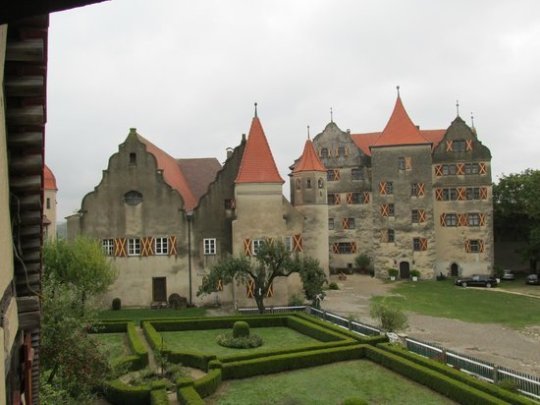

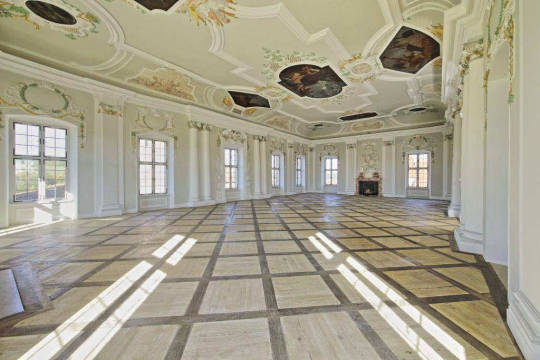





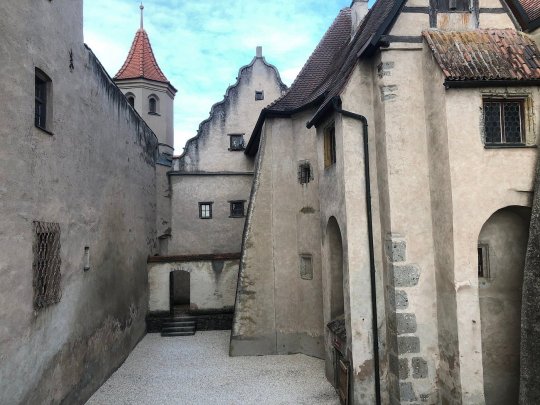

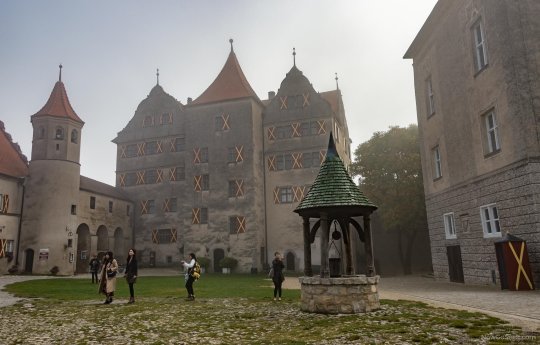
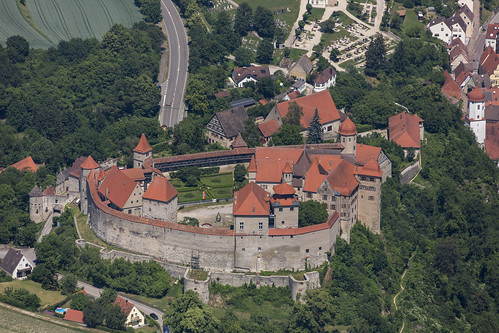
Harburg Castle is located in Harburg, Bavaria, Germany. The extensive medieval complex was built in the 11thand 12th centuries and sits high upon a hill overlooking the town. The castle served as a military stronghold during the reign of the Staufer Kings and was once referenced as the Staufer Imperial Castle. The castle transferred ownership in 1295 to the Count of Oettingen and has remained in the Oettingen-Wallerstein family ever since. Harburg Castle is one of the largest, best-preserved castles in Germany. The complex includes a chapel, sentry walk, prison tower, dungeon, and various other residential buildings. The fortress was extended in the 15th century to include more residential buildings. Further additions and improvements were made from the 16th to 18th centuries, which included the ceremonial hall and the castle church. A wall with six towers surrounds the grounds, and in the center of the complex is a large courtyard with a well. The interior of the castle boasts extensive paintings done on elaborate wood ceilings. The castle once guarded a strategic roadway and is considered practically impregnable; as it never fell into enemy hands. Harburg Castle is open to the public during certain times of the year, but some of the castle is inaccessible to visitors. Interesting side note: Michael Jackson was said to love Harburg Castle and tried to purchase it numerous times without success.
0 notes
Text
US Coast Guard Cutter Calhoun (WMSL 759) Arrives to New Momeport in Charleston
The crew of the U.S. Coast Guard Cutter Calhoun (WMSL 759) arrived at their homeport in North Charleston, Sunday, after delivery from Ingalls Shipbuilding and supporting missions throughout the Coast Guard’s Seventh and Eighth districts. The Coast Guard accepted the delivery of the 10th national security cutter (NSC) on Oct. 13, 2023, after the initial christening ceremony in Pascagoula, Mississippi, June 4, 2022. Calhoun is the fourth Legend-class NSC to be homeported in North Charleston, joining Coast Guard Cutters Hamilton (WMSL 753), James (WMSL 754), and Stone (WMSL 758). Calhoun’s crew began deploying to Pascagoula in March 2023. Following an intense 37-day post-delivery period, Calhoun supported the Coast Guard’s Eighth District in response to an oil discharge approximately 20 miles northeast of the mouth of the Mississippi River in the Gulf of Mexico. Calhoun remained on scene for 48 hours, providing key offshore command and control capability to the multi-agency response. During the remainder of Calhoun’s first patrol, Calhoun provided a forward presence in support of Homeland Security Task Force-Southeast and Operation Vigilant Sentry within the Coast Guard Seventh District’s area of responsibility to deter irregular migration and save lives in the South Florida Straits while testing its vital equipment, systems, and completing required training.
The crew of the U.S. Coast Guard Cutter Calhoun (WMSL 759) arrived at their homeport in North Charleston, Sunday, after delivery from Ingalls Shipbuilding and supporting missions throughout the Coast Guard’s Seventh and Eighth districts. The Coast Guard accepted the delivery of the 10th national security cutter (NSC) on Oct. 13, 2023, after the initial christening ceremony in Pascagoula,…

View On WordPress
0 notes
Note
🍺 - @topaz-adorned
[Find my muse drunk!]
On one of Hyrule Castle's many sprawling balconies, Ganondorf stands, his broad frame leaned against one of the heavy stone rails; its cool surface a contrast to the warmth bubbling within him. A few Gerudo guards stand sentry nearby, but their presence is merely symbolic rather than necessary in this moment of respite.
Holding a leather canteen once strapped under his robe, the Gerudo king beholds the green country of Hyrule as it nestles into the late evening. Disdain written on his features, he tilts his head back and welcomes his brew to his lips. Today had been his grand display, a performance in uniting his people with that pathetic fool Rauru and his country. A private ceremony, witnessed by, perhaps, too few.
His wicked sensibilities like it that way.
That's when instincts, faded as they are, detect movement; it's a presence that's located just outside of his peripheral vision. The Gerudo king doesn't bother looking up to know that he's being observed--it's an unwelcome shadow that has been following him since his meeting with Rauru and his queen in the throne room.
Ganondorf takes another long and deliberate sip from his canteen, savoring the warmth as it hits his gut in anticipation of the inevitable interaction. The sound of the footsteps draw closer, growing more pronounced against the sleepy and open backdrop of Hyrule's kingdom.
"It's you, from before." His voice speaks roughly, almost as though his drink has made his throat raw. "In the throne room."
As the sounds of footsteps cease, a tension in the air begins to grow, causing a shift in his guards as they prepare their polearms on their king's behalf. Ganondorf eventually brings himself to turn and face Bussaba, his gaze charged, crackling the air with intensity.
"If you're seeking another spectacle, I suggest you look elsewhere." His patience already thin, alcohol poisoning his personality. "I didn't parade myself before the royals for your entertainment, nor do I require any new friends."
A sardonic smile.
"I've had my fill of... courtly performances for the day. Take your sad, unyielding eyes where I can't feel them haunt me."
0 notes
Text
Digital sentry safe won t open

#Digital sentry safe won t open code
#Digital sentry safe won t open series
Named for the Battle of Alam Halfa during World War II. Continued probably yearly after that point Alam Halfa 2013. The new exercise series, according to the New Zealand Herald, was made possible by the "Wellington Declaration" signed by the two countries in November 2010. Exercise Alam Halfa: U.S.-New Zealand, NZ-sponsored land forces exercise, Linton and Napier, central North Island, April 26-May 6, 2012.Approximately 3,300 military personnel from 14 allied and partner nations will participate in the exercise. Exercise Agile Spirit 19 began with dual opening ceremonies at Senaki Air Base and Vaziani Training Area in the country of Georgia on July 27, 2019.African Lion – in 2009 described as "Train forces capable of conducting joint and combined U.S., air, and land combat interoperability operations.".African Eagle – U.S.-Moroccan biennial exercise practicing deployment of USAF units to Morocco.African – U.S.-Moroccan EUCOM (now Africa Command) first word.Adventure Express – winter exercise series, dating to at least 1983.Adventure Exchange – command post exercise.Adventure – ACE Mobile Force first word.Operation Active Endeavour – NATO Allied Forces Southern Europe Mediterranean patrols.It did not include the exercise deployment of forces outside their garrisons." ( House of Lords Debate 27 June 1989) "The most recent such exercise took place, on the date and in the format planned, on 12th June 1989. Active Edge was a routine no-notice NATO Allied Forces Central Europe readiness exercise held twice yearly.citizen involved in the broadcast of anti-Noriega material, during the United States invasion of Panama, 1989. Army Delta Force and the 160th SOAR to rescue Kurt Muse, a U.S. Operation Acid Gambit: operation undertaken by U.S.Turkey had requested greater NATO forces to be deployed to meet any Iraqi threat in the leadup to the first Gulf Crisis/War. Ace Guard was a NATO deployment of the ACE Mobile Force (Air) and surface to air missiles to Turkey, between 3 January 1991 – 8 March 1991.Army task force attached to United Nations Preventive Deployment Force (UNPREDEP) in Macedonia to monitor border activity. Operation Able Sentry/Sabre 1993–1999 – U.S.Able Manner – Windward Passage patrols to interdict Haitian migrants, January 1993-November 1993.Able Staff – command post exercise, April–September 1997, practicing SACEUR's nuclear warning system.Able Gain – annual United States Air Forces in Europe field training exercise involving NATO Nuclear sharing forces.Able Crystal – nuclear weapons related exercise.Able Ally – annual command post exercise involving escalation to nuclear use.First gained prominence after the Able Archer 83 nuclear command and control exercise. European Command nuclear weapons exercise first word. Able – NATO Allied Command Europe and U.S.The general system described above is now in use by NATO, the United Kingdom, Canada (Atlantic Guard, Atlantic Spear, Atlantic Shield) Australia and New Zealand, and allies/partners including countries like Sweden. For example, AG through AL was assigned to United States Joint Forces Command.
#Digital sentry safe won t open series
NICKA gives each DOD organization a series of two-letter alphabetic sequences, requiring each 'first word' or a nickname to begin with a letter pair.
#Digital sentry safe won t open code
In 1975, the Joint Chiefs of Staff introduced the Code Word, Nickname, and Exercise Term System (NICKA) which automated the assignment of names.
Exercise terms – a combination of two words, normally unclassified, used exclusively to designate an exercise or test.
A list of several such code words can be seen at Byeman Control System. BYEMAN) which identifies a specific special access program or portion.
Code words – a single classified word (e.g.
Polo and Step) assigned to represent a specific program, special access program, exercise, or activity.
Nicknames – a combination of two separate unassociated and unclassified words (e.g.
Officially, Arkin (2005) says that there are three types of code name: Department of Defense code names primarily the two-word series variety. Please observe the definition of the list when adding or editing entries. You can help by expanding it with reliably sourced entries. This is an incomplete list, which may never be able to satisfy particular standards for completeness.

0 notes
Text
Day of mourning: Canadian ceremony to commemorate Queen Elizabeth II
As the Commonwealth grieves the death of Queen Elizabeth II, Canada is marking her state funeral with a national day of mourning and commemorations in the capital.
A holiday for some, the sombre day will be marked in various ways across the country. In Ottawa, following the morning's events in London, there will be a memorial parade at 12:10 p.m. ET and a service at a historically significant cathedral at 1 p.m. ET. CTV News will have live coverage all afternoon.
The memorial parade will begin at the Cartier Square Drill Hall, a military training facility next to Ottawa City Hall along the Rideau Canal. The parade will travel past the National Aboriginal Veterans Monument and the National War Memorial on Elgin Street, before turning onto Wellington Street heading towards the Christ Church Cathedral.
Canadian Heritage says the parade will include two RCMP Musical Ride detachments, as well as a 100-person military service guard of honour comprised of navy, army, air force and special forces members.
Complete coverage of the Royal Family
A member of the National Sentry Program will carry Her Majesty's personal Canadian flag, and military band members will also take part, as will representatives from each of the 16 military regiments of Her Majesty.
A 96-gun salute—one round for every year of Queen Elizabeth II's life—will be conducted during the parade from a location west of the downtown core.
The service at the Christ Church Cathedral is invitation-only, and is expected to include some 600 guests, from members of Parliament, dignitaries, and members of the diplomatic corps, to representatives of various faith communities, and charities with whom Queen Elizabeth II had a close connection.
Among the confirmed guests in the nation's capital are former prime ministers Brian Mulroney and Joe Clark. Mulroney and former governor general Adrienne Clarkson will be delivering addresses during the ceremony.
Over the weekend Canadian Heritage confirmed some additional attendees, including: Chief Justice Richard Wagner, Deputy Prime Minister Chrystia Freeland, Canadian Heritage Minister Pablo Rodriguez, Conservative Leader Pierre Poilievre, NDP Leader Jagmeet Singh, Ontario Premier Doug Ford, Ottawa Mayor Jim Watson, RCMP Commissioner Brenda Lucki, Chief of Defence Staff Gen. Wayne Eyre, former astronaut Roberta Bondar, and former Bank of Canada governor Mark Carney.
Prime Minister Justin Trudeau and Gov. Gen. Mary Simon will not be present, as they are representing Canada in London, alongside more than a dozen prominent Canadians, at the state funeral.
The cathedral is where numerous state funeral services have been held, and is where a commemorative ceremony was held for Prince Philip in 2021.
Officials said that the ceremony will involve both religious and non-religious elements, reflective of the diversity of religions observed in Canada. Algonquin spiritual adviser and English Poet Laureate of Ottawa Albert Dumont will also give a tribute to Queen Elizabeth II.
The ceremony will include hymns and songs, a tribute video montage featuring an original piece composed by the Canadian Armed Forces for the occasion, and musical interludes by Canadian artists.
Canadian talents Ginette Reno and Rufus Wainwright will each perform a song, and the national anthem will be interpreted by singer and actor Kim Richardson. There will also be a moment of silence in remembrance of Queen Elizabeth II.
People are invited to gather along the parade route to watch, and screens have been installed at the Garden of the Provinces and Territories on Wellington Street for spectators to take in the historic occasion.
When the ceremony concludes, church bells will toll, and there will be a Royal Canadian Air Force CF-18 flypast in the "missing person formation" moving over Parliament Hill, towards the cathedral.
Canadian flags that have been flying at half-mast on all federal buildings and establishments in Canada and abroad, including the Peace Tower, are expected to be raised at sunset on Monday, marking the end of Canada's official period of mourning.
from CTV News - Atlantic https://ift.tt/YGx1zBP
0 notes
Photo


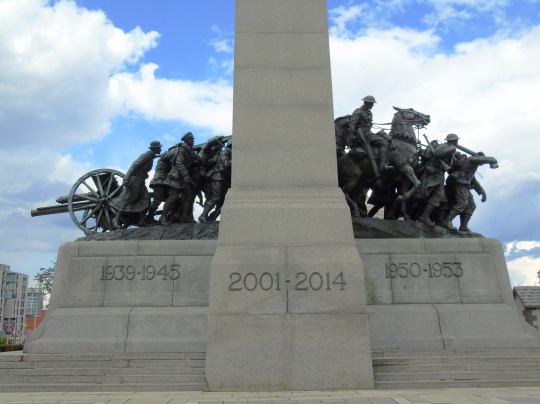

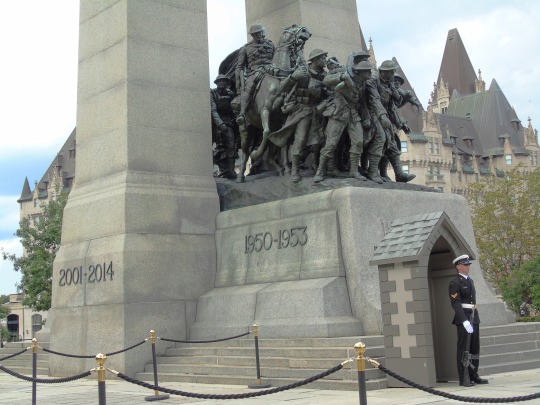
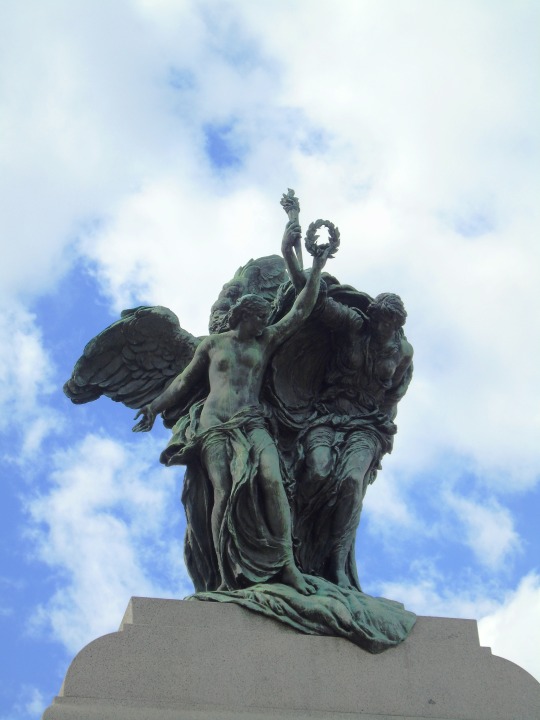


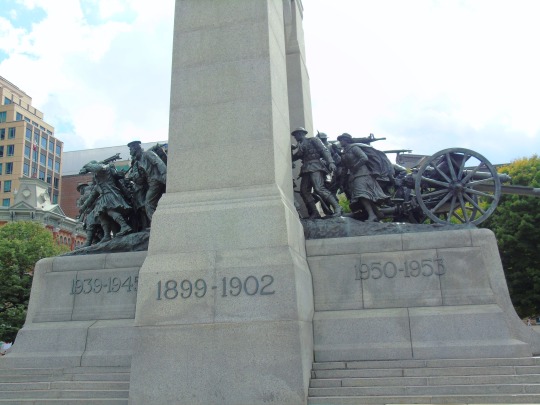
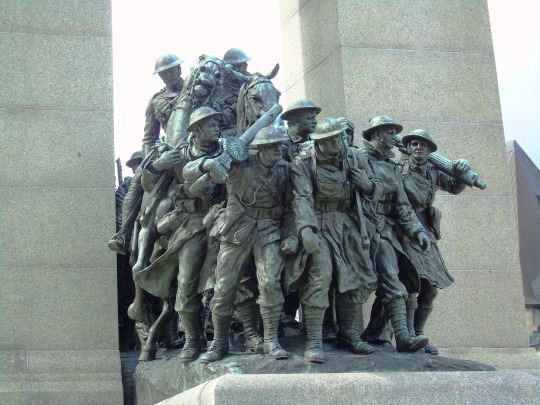
The Canadian National War Memorial was unveiled by King George VI and Queen Elizabeth in Ottawa on May 21, 1939.
#The Response by Vernon March#Canadian National War Memorial#unveiled#21 May 1939#anniversary#history#Ottawa#Ontario#Canada#travel#evening#public art#original photography#tourist attraction#guard sentry#flower wreath#Ceremonial Guard Sentry#Confederation Square#Tomb of the Unknown Soldier#summer 2015#2018#arch#landmark#Mary-Ann Liu
2 notes
·
View notes
Text
Dusik's Self-Isolation, the "Doorkeeper" Poem, and Hyejin's Presence
It's been said many times before about Dusik, but episode ten once again showed how he has dedicated his life to a series of active choices that results in purposeful denial of providing love to himself. He deliberately distances himself from others and tries to deny his love for anything and anyone as a way for repenting against his past 'sins' of loving people who all died too soon.
To Dusik, his love has been nothing but a condemnation to others and himself, and he feels like he must live a life in limbo purgatory as penance, neither giving nor receiving too much companionship, lest he condemn another person via his love. Is his carefree lifestyle that carefree? Or is it his way of willfully keeping himself from attaching to anything? Because life has taught him that if he has strong emotion for something, then that is a harbinger of destruction for what he loves.
All the people he cared for most in his life died too suddenly and too early in his life, before he could process how to say a proper goodbye. And he feels directly responsible for at least one of their deaths--we see him say so explicitly to both his therapist in general and in more detail to Hyejin about his grandfather. To Dusik, his grandfather died because he let himself love soccer more than being vigilant, even though he didn't know there was anything to be vigilant for at the time. Then after his last loss in his mysterious five years away from Gongjin, it seems like Dusik abandoned direct expressions of love for anybody. He learned that vigilance is the only expression of love that he should offer other people.
Staying vigilant of other people's needs while also staying vigilant of not getting too close is his way of protecting other people for their needs and from himself. This is partly why he tried to deny his feelings for Hyejin for so long, dancing between the friend zone and something more. (As an aside, this focus on his own vigilance may also play into his love for photography. He seems drawn to capturing moments to look back on, not wanting moments to pass by unnoticed.)
As part of his vigilance, Dusik created a life for himself back in Gongjin as an unemployed jack-of-all-trades, a fix-it man, an unofficial neighborhood chief that can show up at a moment's notice when help is needed. Dusik has made himself into a person that can be reliable in any situation. And he threw himself into that role by learning as many trades as possible so he could fix any problem, from HVAC repair to barista certification to fruit carving and anything in between. But even though he wants to be known as a reliable entity in town, he also makes sure to position himself as a periphery figure only. He only shows up from outside other people's routine lives. He purposefully does not live on any fixed schedule that is permanently tied to anyone else, and he surrounds himself with a thick air of detachedness. This is how he ensures he can't become an albatross to anyone's life again. He can't be accountable for destruction of life if he's simply a hired part-timer and a neighborhood helper; and nothing with any inherent responsibility that can't be explained away by utility rather than love.
Sure, he's a chief that other people turn to for help, but he rejects anything more official than being a helpful neighbor. He refuses to express his love for individual people because experience has taught him that his love can destroy lives, so he only shows his love for the people of Gongjin as part of a whole entity, detaching himself from anything that can be seen as preference for individual people. This is something Chunjae noted in their conversation the night Juri ran away. Dusik accepts other people's problems and their joys, but he doesn't actively share his own in full-fledged reciprocation. The exception seems to be halmeoni Gamri, at least to some extent, but even then he tends to frame any explanation of him going above and beyond for her as a way of paying back for how much she cared for him growing up. Dusik lives in his own manufactured limbo where he has made his existence entirely fixed as an untethered entity.
Dusik has turned his pain into a lifestyle where he knows he must keep his heart guarded from other people by becoming too attached, keep himself from sullying his hometown and the people he's dedicated himself to with the infection that is him asking for reciprocity. His infectious disease is spread through baring himself and his full-fledged feelings to other people, and thus he quarantines that part of himself from anyone. Denial of love is his love. So he flits from job to job, works for minimum wage, and tries to pretend that he does not attach himself to anything or anyone but himself. It's easier for everyone this way. That way he cannot drag anyone down into the surf that is his destruction.
He has decided that it's better for him to be a solitary observer, taking up space in a manmade shipwreck away from others, both literally and figuratively, as is shown by how he made the choice to keep his grandpa's boat out of the water, perching it on a hill so high and isolated that he could barely get it up there in the first place. Even if it is incredibly difficult to do, he is determined to meet his goal of self-exile. It's the only way he knows how to protect himself and everyone else, through self-imposed isolation.
But like the poem Dusik read to Hyejin, once she entered his life, she would not stop showing up for him. She didn't willingly ascribe to the rules he set forth for other people. He told her to cross lines freely, as if she had already been doing so. She may have verbally pontificated about not crossing lines, but her actions said otherwise, and she was crossing Dusik's boundaries before he even knew it. She didn't fit perfectly into Gongjin or Dusik's life, and her stretching the limits of what is 'acceptable' is what he needed to open himself up to a new perspective other than steadfast solitude. It was through her own actions, stepping into his circle of solitude and making her presence known, that he began to question if isolation was really what he wanted and preferred.
From the very beginning, Hyejin asked Dusik to stay with her, literally tugging on his shirt to keep him from leaving on the beach the first day they met. And she hasn't stopped holding onto him. First it was out of helplessness, then when she held onto him and asked him to stay before her first town hall meeting, it was her asking for his support, then when she ran into his arms when she was scared, it was her showing her deep trust for him, and now most recently, in her half-asleep state on the couch, it was her desire to emotionally connect with him in a way more profound than he does with others. Her presence is her way of asking him to open the door to his heart.
And like the poem said, and what Dusik realized as he was reading it, his staunch gatekeeping betrayed him and he fell in love because of his own stubbornness in refusing to leave his post. He found someone who reliably showed up to his post as dependably as he does. Or rather, she showed up and found him in Gongiin. He was always there to keep his metaphorical door closed, and she was always there to check if it was still closed. Dusik was so sure that gatekeeping would keep him safe, so sure that his constant monitoring and vigilance would keep him protected, that he failed to realize what would happen when he began to rely on his denial. His continued refusal became something reliable in itself, though not because of him, but because of her showing up. After all, what is there to refuse if there is not someone knocking at the door every day? His vigilance betrayed him because he forgot that actively guarding his heart was also keeping his heart active.
Dusik tried to deny Hyejin entrance inside his heart, but then her existence in Gongjin took up space all around him. She became like the sea itself, constant and deep and reflective. And just like Gongjin would feel incomplete without the presence of the sea's waves lapping on its shore, so too is Dusik starting to feel incomplete without Hyejin's assured presence. So much that when she's gone, as he said at his grandpa's memorial ceremony after she left, he misses her so-called noisiness and disruption of his habitual silence. He misses her. Without him realizing it, the silence he used to crave has started to feel like an empty void, and it's no longer silence he seeks. Instead, it's the steady sound of her waves crashing against his shoreline that has started to bring him comfort. Her tides coming and going, leaving bits of herself behind with him and changing his coastline with her presence is more dynamic and interesting than the unvarying landscape of the dry hilltop perch he made for himself.
Dusik's gatekeeping has evolved in that its purpose is no longer about resolute solitude and staying away from others, but about taking up patrol in order to be near her. Subconsciously Dusik found himself willing to abandon his sentry, not even noticing that he was walking away from his guard post and leaving himself wide open to her. This is so interesting coupled with the line Hyejin said a few episodes earlier, "He's always around when you least expect it." Both in that she too unexpectedly became a part of his life like she claimed he did with hers, and also how in some ways the reason he is always present is because he actively finds ways to show up around her and enact his gatekeeping. Just like the lines from the poem, Dusik became the doorkeeper whose "job is to wait for you the next day to deny you. / My job is to wait for you the next day and fall in love with you."
And then Hyejin confessed, and Dusik made the conscious choice to abandon his barricaded doorway to go be with her and kiss her. Because his barricade wasn't worth keeping up if she was baring herself to him so openly and and unguardedly. Isolation and vigilance lost their meaning in the face of the buoyancy he feels when he is with her. Hyejin tried to say that he could leave his door closed. She put her hand up to his mouth, and with that she meant she didn't expect anything in return, that he could leave his door closed, and she would still be there, her feelings unwavering. But her bravery made him brave as well. And he made the active choice to pull back his own door, lower her hand, and kiss her. Now, his doorkeeping is meaningless without her. And after all these years, his carefully cultivated isolation is worthless if it means isolation from embracing Hyejin's presence as well.
The poem said, "denying my love is my job," but Dusik finally realized he was ready to accept more than just denial in this life with Hyejin. He was finally ready to make the active choice to accept someone in his heart again. Hyejin's presence made Dusik acutely aware of the weight of his isolation and he knew it was again time for him to firmly reject something. But this time instead of rejecting another person, instead of rejecting the feelings of reciprocal love, he rejected his own self-isolation. His rejection was in favor of love rather than against it. Hyejin knocked, completely content with the closed door of Dusik's existence, but this time he flung his door open and made the move to kiss her and return her feelings back. His purpose is no longer to deny his love, it's to accept love and give love back to her.
-----
And just in case you wanted to read the poem in full, I've pasted it below:
"Doorkeeper" by Kim Haengsook
It's my job to say, "You shouldn't do this here."
It's my job to deny your purpose.
It's my job to deny you the next day.
It's my job to wait for you the next day to deny you.
My job is to wait for you the next day and fall in love with you.
Thus, denying my love is my job.
I will not cry because of my vocation, he wrote. I cried sometimes when I wrote a diary.
#hometown cha cha cha#kdrama#meta#my meta#homcha meta#also the full poem is under the cut at the very end of this post#once again i am incredibly late with my meta bc i am bad at dedicating time to revising and reformatting for tumblr#this sat in my drafts for DAYS#this meta is long and full of metaphors and the tenses are kind of all over the place but i'm proud of it#me writing better essays on tumblr than i ever did in school lol#fyi the part above the cut is sad but it gets a lot more hopeful at the end once hyejin is introduced
75 notes
·
View notes
Text
Nights at the Circus: Part XXXIV
It seems like everything that possible could be is standing in your way of rescuing Loki on his execution day! Will you make it in time, or will all be lost when the sword falls?
SERIES MASTERLIST
Content Warning: tense moments, descriptions of fighting
Word Count: 3k


“So, if we even make it, what’s the plan from there?” you asked once yourself, Thor, Steve, Wanda, and Pietro were on the roof of the Tower.
Thor gave you a serious, concerned look. “Honestly? No idea.”
“NO IDEA? What do you mean, no damn idea?” you raised your voice. “What’s an Asgardian beheading ceremony even like? What’s the security detail? The two of us have ONE CHANCE! We can’t just charge in there like a couple of fools!”
Thor shrugged. “I’m afraid all we have time for is to charge in there like a couple of fools.”
You nodded, quickly accepting this. “Fine. I guess if I die there I’ll at least have a shot at Valhalla.”
“But I will say this,” Thor added after a moment, “we have to be swift, strong, and unyielding. Asgardian soldiers are the finest and most lethal in all the realms. And this is the execution of a prince, which is unheard of. I imagine Odin has doubled all sentries.”
“So we’re more likely to die than to save him? Suicide mission?”
A silent pause, then Thor said “Basically yes.”
You bit your lip and looked at the other three standing worried nearby. You ran up to Pietro and Wanda, taking each in an arm and embracing them both. “I owe you my past, and my life,” you mumbled. “Thank you. If I don't come back--”
“--you will,” whispered Pietro.
You looked at Wanda, unsure of what to say. “We’re a long way from home, aren’t we?”
Wanda smiled. “Not so far away. Anyway, I think you know where your home is supposed to be, now.”
Then you took a moment to take in Steve before running into his arms. “I know we’ve been through some dumb shit, but--”
“--that’s over now, you have more important things to attend to,” said Steve.
“If I die,” you said quietly, “please kick the UN’s collective ass in my memory.”
Steve chuckled. “I can’t promise anything extreme…but you bet I’ll raise some kind of heck in your honor.”
“Raise some heck, huh?” you said, smiling in spite of yourself as you pulled away. “Oh, you still have a ways to go.”
“Well,” he replied, “when you and Laufeyson return, you can go back to making me incredibly uncomfortable on a daily basis.” You nodded, giving a mock salute. Steve stood at attention and returned it with a real one. You wanted to cry.
“Go make a miracle happen, Firebird,” he encouraged.
Turning to Thor, you nodded. “Shall we?”
You took a deep breath and closed your eyes, and as you slowly let your breath out, you did what Svetlana had said, and willed. Simply willed. After a few frightening moments of uncertainty you felt your body begin to gently reform into a billow of light gray clouds, wafting above Thor’s hammer.
Fuck, this feels weird. This one’s getting filed in the ‘only when necessary’ cabinet.
Thor threw Mjolnir into the air and summoned a loud, heavy pillar of rainbow light, the Bifrost.
Your trick was working. Heimdall was letting you through. You only hoped it wasn’t too late.
-------------------------------
Of course, Loki’s heart pounded as he was retrieved from his holding cell in his father’s palace, several hours after arriving home.
“I see my last appeal has failed,” he said solemnly. “Very well, then.”
It was never in the heart of Loki Laufeyson to surrender to death, torment, or strife without a little struggle, but every measure had been taken to subdue the Prince of Chaos. Every magic-resistant shackle, wall, and guard constantly surrounded him. He couldn’t even piss without at least five pairs of eyes on him.
It had been perhaps four hours since he was brought and thrown at his adoptive father’s feet. Odin, for his part, was remarkably calm, seemingly almost reluctant in his judgment to follow through with the original vow of a beheading. “How can we ever stand to trust a servant of lies, even my own son? You cannot be controlled or reigned in, and you have proven that too many times to further be ignored, or to further put the realms in danger,” he sighed, exasperated. “Know that I do this out of duty only.”
Duty or no, hearing the man Loki had grown up seeing as his father sentencing him to death somehow wasn’t reassuring.
Odin continued. “I’ll show you two kindnesses. I will arrange for an expert swordsman, and I will have it carried out within a few hours, so that you may not languish.”
What a gift! Loki sneered under his breath.
Thor had tried his damndest to be his brother’s lawyer, but Thor, for all of his strength and charisma, was not much for the intelligence required to persuade his father. Ironic, seeing as if the roles were reversed this evening, Loki likely would have had the prowess necessary to save Thor’s head. After being refused one final time, Thor stormed away in a rage, vowing to be back and yelling loutish threats about how nothing had better happen until he returned. Of course, this request was not granted.
Despite Odin’s ‘kindness,’ Loki did, indeed, languish. I have faced death before, he thought. Why is it only this time I feel true fear?
He knew the answer immediately. It was you. In giving Loki something different to live for, having it taken so forcefully from him, separating you by death, it bore the realization that he would never know love again. Never again would he see your smile, your flaming hair, your naked body shining in the moonlight, begging for him…
Were you able to hear me, Y/N, Loki prayed, I would assure you, I will be fine, and please move on from me. Find happiness. Find your full power. Do not take revenge. Please…
He knew you had the temper to match your powers, and that you’d be prone to taking vigilante justice into your own hands. All Loki wanted was your safety, and were you to choose the wrong path, his sacrifice would be all for nothing.
Thor, Loki prayed again. Take care of her. She was to be your sister. And don’t EVER let Rogers near her.
The cell made Loki feel small, but he found himself the life of the party when his guards came to retrieve him. The walk from the holding cell to the block outside the palace walls was considerable, taking into account the many winding hallways, passages, and gates. A brisk young man in a hurry might’ve made the trip in ten minutes. Loki’s procession was in no hurry.
He ran through these halls as a toddler, Frigga chasing merrily after him and Thor goading him to catch up. As a boy, the brothers spied on the beautiful maids and butlers from just around the corners, eavesdropped on Odin’s court, and practiced their melee fighting (at least until they were old enough to discard the wooden swords for real ones and have a battle tutor), sliding up and down the corridors for what must have amounted to miles. As an adolescent, he practiced his posture and authoritative, princely walks by pacing up and down this very space in the middle of the night, while all else slept.
When he became old enough for Odin to deem him able to witness executions, Loki had attended as many as possible. Truly, there was a sick, morbid fascination to the ritual itself. Asgard loved its ostentatious ceremonies, and the forceful dispatching of life was no exception. Loki himself knew the path well.
The condemned was always paraded through the halls before being taken to the palace’s shrine to Yggdrasil, where said condemned would fall before the icons and images of the pantheons of the Nine Realms on their knees for one minute while his handler read his formal sentence. He barely listened throughout the winded speech, only picking up words like “traitor” “death” “beheaded” etc.
So, this is how it is, Loki thought sadly. This is how I leave this world. This is how I leave Y/N. On my knees, humiliated and made to repent for the sin of saving lives.
The executioner stepped forward, a large two-handed sword sheathed in a scabbard slung over his shoulder. “I am your dispatcher,” he recited the words Loki himself could recite. “Will you grant me forgiveness for this regrettable duty?”
Loki wondered if any of the condemned had ever sincerely expressed forgiveness, or if every single one resented their will-be killer and only recited the assigned words in order to keep their own dignity in their final moments.
“I do,” Loki muttered halfheartedly, avoiding eye contact and looking away. A few of the guards raised an eyebrow at the less-than-dignified response. As if I’m going to smile for the audiences who have gathered to see me off to Hel!
“Then, by the command of Odin the Allfather, I am now to lead you to the block, where your head will be stricken from your body.”
“Sounds great.”
Loki was jerked to his feet roughly by a guard, who took no care to make sure he was balanced or stable. The disgraced god shook him off violently, so suddenly that two others had to ensure Loki was ultimately restrained.
“Hold still!”
Loki held his nose high. “I demand some dignity! I am a Prince of Asgard!”
The executioner shrugged almost too nonchalantly for the event at hand. “Not anymore.”
As Loki was led in the procession towards the stage where the blessed event was to take place, two young women in white scurried past in order to beat the parade to the place of execution. The bright gossamer material trailed behind the beautiful girls like wisps of tender cloud. Loki even thought he heard the silly girls giggle as the dashed around a corner.
Y/N would’ve outshone them all in a bridal gown half as elaborate, Loki thought, your face popping into his mind. How she would have been like the sun walking toward me…
Loki vowed to never apologize for his actions leading him here, and not just the bursts of magic that spared the Avengers from total carnage. I will never regret anything that brought her into my life, he promised.
Perhaps history would look upon him as a tragic figure who died for love. The Loki who inhabited his body before the attempted attack on New York would have resented such a reputation. Now, at this moment, Loki couldn’t think of a more worthy thing to give himself for. How much had he changed in the few months alone since you entered his life?
The light of day accosted his face as he was brought into the open air, silent rows of Asgardians lined to catch a glimpse of the condemned prince as he passed. No one looked angered, or even excited. The entire assembly was solemn. This was not expected: some times people cheered and chanted at executions as if watching sport.
Within moments that seemed like an eternity, Loki stood on the stage at the front of a massive crowd of Asgardians, a slow, steady drumbeat measuring out the last tempo his heart would ever beat to. Ona balcony overlooking the arena, Odin stood, alone and tall. Loki could not make out anything on his face, but he was sure it was a look of satisfaction for finally getting rid of that Jotun monster Odin attempted to suppress and failed.
For being such a rich, complicated ritual, the actual beheading of the condemned was typically over within a minute of the prisoner reaching the arena. Loki barely had time to register his location before he was pushed forward and forced to his knees before the block, sitting before him like a headstone.
He closed his eyes as the drums’ tempo reached a climax.
Well, no sense in going out like a coward, he thought. He bit his lip as he did one last thing for himself before his final surrender. Usually final words were not granted a condemned prisoner, but Loki loudly and clearly spoke the last words he ever wanted to fall from his lips:
“Forgive me, my Firebird, for I must leave you now.”
The crowd murmured at his declaration. Even Odin’s stoic facade was cracked at the surprise vocalizing from the otherwise-silent prince.
Loki took one final, deep breath, taking an extra moment to appreciate the mundane odors in the air that he would never sense again, and humbly, he stretched his neck over the block.
Executioner, swing true and dispatch me quickly, he prayed.
He’d never died before (at least for real), so he wasn’t sure what to expect. Would it hurt or be too swift to feel pain? Would he find himself in an afterlife, or in Niflheim? Would there be nothing at all? Would he find himself being reborn as another?
One thing was for certain: he did NOT expect the sudden screams and the smell of smoke to fill the air around him, followed by a loud explosion that sounded suspiciously like thunder. Looking up, his head was still attached to his neck, and Loki could barely see beyond a large wall of smog obscuring the arena. Lightning flashed through, hitting the stage and sending Loki, his handlers, and his dispatcher flying against the proscenium. Pain shot up Loki’s side where he landed, immediately too stunned to get to his feet.
He squinted to see through the chaos and smoke, and after a moment, two bodies emerged from the haze, one wielding a hammer, the other lit up like a comet streaking by a sun.
Thor raised his hammer in warning while you threw a fire missile at the executioner, who scampered away after you chased him off with three more fireballs in quick succession, each one landing perfectly as Clint had taught you.
Loki couldn’t believe it, yet he also somehow did believe it. You’d made it to Asgard, made it to him.
Guards began circling the stage, advancing on you and your battle partner. Thor launched his hammer into the group of them while you set the stage curtain ablaze, quickly spreading the flames so that the spectators began scrambling to leave. You punctuated your assault with a large firebolt that sent a mushroom cloud flying into the sky above the arena.
As Thor continued to wreak havoc on his father’s soldiers, you found an opening in the assault to leap down to the proscenium to break Loki from his magic-resistant shackles, but not before scoping his face in your hands and kissing him.
“Ah! Ow!” Loki cried.
“Oh, sorry!” you apologized, not realizing you forgot to turn your hot skin down before touching your beloved.
“I told you not to come here!” Loki scolded.
“Scold me all you want in bed later, but I have to go be a bad girl now,” you smirked, making quick word of the chains around Loki’s arms and neck. “And if you want to save your neck, I suggest you be bad, too.”
Loki grinned and cupped your cheek, pulling you in for another kiss. “I love you, darling.”
Winking, you replied, “Oh, I fucking love you too. I’m sorry I was late!”
You helped Loki to his feet, and he immediately took advantage of his freedom to summon his magic. You ran ahead of him back into the fray, where Thor was still doing all he could while fending off literally tens of guards at one time.
Blasting, blazing, and bursting, you, Thor, and Loki fought valiantly against the guards advancing on you. You were finally at full power. There was nothing holding you back from tearing the room apart, and you felt the energy feed you flames like gasoline.
Letting your body fall away into smoke, you wafted into the air and shot fire from your soot cloud, sending more guards flying off the stage before they could even reach their targets.
A deep, loud voice boomed from above: “ENOUGH!”
The word frightened you enough to steal your concentration, and you fell back to the ground in corporeal form once again, and Loki just managed to leap out and catch you before you broke your spine against the floor.
Odin Allfather was standing on his balcony, a scepter raised high in the air with pride and authority. “I SAID ENOUGH! GUARDS! STAND DOWN!”
Odin’s subjects immediately obeyed his order and took several steps back, leaving you and your Asgardian companions back-to-back-to-back on the stage in the now-deserted arena.
“Thor? What is the meaning of this? Who is the fiery one?” Odin demanded.
You stepped forward. “I’m Y/N, or as they sometimes call me, Firebird. We’re putting a permanent end to the bullshit right now.”
“Do not address me so informally,” Odin replied. “I am the King of Asgard.”
You sneered. “Look, King, I’m really at the end of my rope. You’re about to hack off my lover’s head for no legitimate reason. I feel like I’m at least entitled to one last appeal.”
“Of what realm are you?” Odin asked.
“Midgard,” you answered.
“She’s an Avenger, like me, Dad,” Thor added. “We work together.”
“And, did I hear you refer to Loki as your lover?” the King inquired.
“Well, I don't normally do this kind of thing, unless its for someone special,” you said. “We’ve been dating for a few months.”
“Dating?” asked Odin, shrugging at the term that was unfamiliar to him.
“Courting,” answered Loki, his voice low as if testing the waters before deeming it safe to raise it.
Odin looked down at the three of you for a moment before tapping his scepter on the ground three times. The few sentries still in the arena stood to immediate attention. In fear, you grabbed Loki's hand. He gave it a squeeze.
“It’s getting cold,” Odin finally said. “Let’s go inside, and I will hear this appeal. If a little Midgardian is willing to go through so much for my son’s sake, perhaps she’s worth listening to.”
----------------------
@huntress-artemis
@el-zef
@lokisgoodgirl
@mochie85
@mischief2sarawr
@michelleleewise
@lokisninerealms
@toozmanykids
@xorpsbane
@lokisasgardianvampirequeen
@goblingirlsarah
@thedistractedagglomeration
@unlucky-number-13
#loki#mcu#mcu loki#fanfiction#loki fanfiction#loki laufeyson#mcu fanfiction#loki x reader#loki/reader#avengers#mcu avengers#asgard#thor#odin#reader has powers#loki laufesyon x reader#reader insert
59 notes
·
View notes
Text

Blood Moon Letters
Back to The Ninth Blood Moon
As ever, Link couldn't answer but instead smiled and closed his fist to his heart. His courage nearly failed him before he pulled out his letter and offered it to her. He tried to memorize the pleased look on her face and the sparkle he would swear to any goddess was made of molten sapphires shining in her eyes. This letter may well cause her to turn away from him next time. She may never offer him such an unthinking smile again.
Dearest Zelda,
I tried to access the castle today but was repelled effectively by the guardian sentries. I will be searching for the back way in through the rivers. My memories of the castle are limited, but I recalled a back entrance that we used once to slip away? I'm not sure the context, but we seemed to be hiding from royal guards rather than invaders. I remember you running away from me, sometimes. Did we sometimes run away together too?
Zelda,
It's been several days since I started this letter and I've finally completed my work with the Rito. I allied with a warrior and together we forced Vah Medoh to drop its protective shield. With that down, I was able to enter and battle the Blight within. Revali is ready to attack Ganon at your command. He has not changed. I hope that this third beast has once again taken a load from your back.
My Zelda,
I have remembered you in more ways than I could ever dream. For so long I believed that I was your servant and your shackle, but I think it was more than that. How did we become friends? I can remember days of fondness between us without the need to stand on ceremony. I called you 'Zelda' once and I remember your laugh at my stricken face. I dearly wish to hear your laughter again...
My Zelda,
I hope tonight is the night that I see you. It is impossible not to believe in you after all we have been through together and all you have accomplished alone, but I still cannot find rest without seeing you safe and strong with my own eyes. You said once that my customary gesture means vital and courage and affection. You are right that it means all those and more. Those words all mean heart and I believe you have mine. Please care for it while we are apart.
Ever thine,
Link
22 notes
·
View notes
Text
Chapter Ten
A Court of Shadow & Ribbons Wanna start at Chapter One?
*
Mor apologised the moment they entered the sitting room.
“I’m sorry for the subterfuge, but Azriel knows about me and he…..”
Emerie had not let go of Mor’s hand and as she spoke, Mor found herself being turned toward the female who had captured her attention at the party, and even before that. Mor was staring into Emerie’s hazel green eyes and losing any capacity to finish her sentence.
Emerie said “Now, I know too” and kissed her. Not a passionate kiss, a request of a kiss. Mor sizzled and held tight to Emerie’s hand, putting her other around her waist to hold her there. She didn’t let Emerie move back from that touch, Mor licked her lower lip and went back for a more intimate meeting.
Emerie sighed and felt herself going pliant and loose. She stepped toward the lounge, pushing Mor backwards to sit facing each other, stroking her hands in Mor’s hair, around her waist and over the perfect lines of her cheek and jaw.
“Oh I’ve never known what this felt like”
Mor stopped kissing Emerie’s ear lobe
“Just you wait” she whispered, Loving the shiver that ran through the female with her
“I just want to feel you and have you here with me, but tell me what you want” She hadn’t stopped touching and feeling and kissing, and Emerie’s eyes were closed when she murmured
“More of this for now, please don’t stop”. There they stayed, on the lounge as the sun rose and they discovered each other. Mor stopped at one point to ask if they should move from the sitting room
“Nope, this is it for now, I want to fall asleep here with you Mor” Emerie answered. So they did.
*
The training ring was pink with the streams of sunrise when Azriel landed. He found the rose with it’s chain in his pocket and strode into the house and his room. He couldn’t believe that Nesta and Cassian had not fallen asleep yet as he heard the low murmur of Cassian’s deep voice followed by a higher demand from Nesta. Mother save him from having to hear much more of that.
The house seemed to respond with some modicum of decency and muted the increasing sounds from their room. As Azriel closed his door, the moaning was left behind altogether.
He went to his armoire and opened the furthest right bottom drawer. In to it, he placed the jewellery beside a small cedar box. The only item that he kept from his childhood – a gift from his mother created when he was discovered to be a shadowsinger. She had placed a few items in it as he grew, even when he was imprisoned and she was unable to contact him. A lock of his hair, a note she’d written and a tiny dagger that she hoped he’d be able to learn to wield as he matured.
He picked it up for a moment. Re-promising that his children would be loved in person, daily, and never would come to hurt whilst he breathed
He closed the drawer with his foot and changed into training gear. His body screamed at him for some sleep but he kicked back at the need and told himself “after training”.
*
Most of the girls were already at the roof by the time Azriel arrived. Emerie was of course not there, nor were Nesta and Cassian. Apparently you do not have to train the day after your mating ceremony. All of the others were there including Lorelei and Roslin who had perhaps drunk more alcohol than they should at the celebration.
Those who had not attended the festivities were happily listening to the stories from the ceremony. Many of them had heard the tale of Gwyn’s singing and were congratulating her as they warmed up.
“Gwyn”. Azriel got the attention of the entire group. He indicated that Gwyn should join him at the front and she was nervous.
“We are a little short on instructors and members today, so I thought it might be nice if Gwyn led us in a warm up”
“Phew” Gwyn sighed inwardly and took a big breath. The best moves that she and Nesta and Emerie had found to get moving everyday were easy. She felt comfortable with the trainees and not pressured by Azriel. She could see him out of the corner of her eye correcting stance and core strength movements.
Everyone was flushed and perspiring by the time Gwyn finished the last rhyme. Azriel broke the females into three groups of three and had them sparring with staves, the third person of each group was the watcher to help with their feet and defence in-case anyone was having a particular problem.
Funnily enough, that left Gwyn and Azriel. Azriel handed her a heavy shield and led her to the area with a little more room.
“Sometimes, you won’t have a weapon but you may have some protection. Learn to use it to stay alive longer against an armed opponent”
Gwyn stood awkwardly holding the wooden metal plated implement on her left arm. Azriel attacked with deliberate slowness, signalling where he was going with each strike of his staff. Gwyn dodged and held, shuffled her feet and moved her weight to take every blow. Azriel sped up and reduced his warnings until they were both running with sweat and one of the other groups had stopped to watch them.
Azriel did not yell as Cassian could sometimes drag on his General’s mask, he merely indicated with a hand and “Ladies” -for the females to gather to watch.
“You see how you can fight without fighting? Defence can be the best way to stay alive until help arrives or until you are able to locate something more like a weapon”
Gwyn stumbled as Azriel spoke, attention lost in a memory of desperately waiting for help to arrive. Too late. Help came too late, even in the form of the winged assassin standing before her now. She dropped her eyes and Azriel continued to address the others.
“Get into a line and you can each have a moment to attack me with your staff, one at a time. Let’s go.”
The Idisi formed up immediately and began an assault on Azriel, giving Gwyn space to step out of the ring to get a drink. Why couldn’t she just get over this? How could the mention of being in danger make her stop thinking? Stop fighting? It had not happened on Ramiel. She thought that she was Valkyrie and unstoppable. Breathe she told herself, just breathe.
Once her heart rate had calmed both from the exercise and the panic, she returned to the line of staff wielding priestesses. It was time to have her revenge on Azriel’s earlier attempts at her. She would not be cowered and would never again be simply left waiting for help to arrive.
Azriel looked pleased to see Gwyn reach the front of the line and the others had begun to stretch and to drink water before the cool down.
“Apologies if I triggered something there, you were doing really well”
Gwyn stepped right then left and slammed the staff toward his exposed left wing. Azriel ducked and laughed at her audacity, but got his shield up in time to block the next blow.
“Now that was serious” – he blocked a third hit, but with effort and when Gwyn spun and angled the staff at his shins, he had to jump back to protect himself.
“You’d better give Azriel, I can do this all day” She grunted as she threw another two-handed attack at his neck and shoulders. Her feet were actually getting faster as she became more comfortable with the longer weapon. Azriel knew he could out manoeuvre her without a time limit, but she was so strong, so resilient he knew working her to exhaustion today would not be helpful. She needed this confidence and she needed more training and further fitness, but Cauldron was she a warrior.
After a resounding clash of staff and shield, Gwyn aimed a particularly good weight at his upper arm and connected. It was not enough to take Azriel out of a sincere fight, but it was a move that deserved reward.
“Give. I give” Azriel admitted freely. He was not winded, while Gwyn was pink and panting slightly. She knew without commenting that Azriel had forfeited. She didn’t mind. She had hit him after all!
They both drank greedily and Gwyn wondered if she was doing anything useful toward gaining Azriel’s affection. He was just the epitome of trainer today, although he’d focused on her a bit more than normal. She looked over at him and smiled, he gave her a nod of appreciation and she lowered her eyes.
“Form up Idisi” Azriel’s voice carried easily across the rooftop.
“Gwyn, please lead the cool down?”
Gwyn stepped out of the line sideways and began the relaxation chant.
Azriel stood sentry still, but took it all in, tensing and relaxing different muscle groups as the trainees breathed steadily and stretched. He was just nodding off, his wings held slightly open and his eyes closed. A stiff breeze nearly knocked him over and he realised that he was asleep. Thankfully he had no more appointments for the day and could just wash and sleep.
The females were saying goodbye and thank you to him and Gwyn was storing the staves and shield and tidying up around the ring as Azriel went to enter the house. He called out
“And thank you Gwyn for your help. And for reminding me to protect my upper arms!” He smiled at her and she grinned.
“Anytime. You are certainly training me to keep up my guard”
He turned again to look at her and she made a face like she had not meant to say that.
“Oh. You’re doing really well, so, you ah, you should feel good about that. I’ve gotta go, I haven’t been to sleep yet. See you tomorrow”
Gwyn nodded and headed off, embarrassed that she had dragged that information out of him. Where did he go after he dropped her here? He must have been back by dawn, he had got changed for training. Did he go to the nightclub? Did he hook up with someone? Gwyn cursed herself for a fool. He’s an experienced male who is your trainer. Why would he curtail his fun just because you spent some time with him? Why indeed when she’d given the gift back?
*
She used the library to forget all about thinking and re-thinking through last night and her memories of Azriel. The other priestesses, especially Merrill, wondered where she got the energy to run from place to place and help others with heavy tomes.
She just wanted to be exhausted by dinner time. Just wanted to sleep with no tossing and turning.
Azriel slept. No dreams, no startling awake. He drifted off hearing Gwyn singing in his head and woke up having barely moved. It was pitch black outside so night had fallen, but it was hard for him to surface from the total relaxation that he’d found. He merely checked his windows and his connections to Rhys – no emergencies, and stretched his wings. Laying on his other side, he fell right back to sleep.
*
16 notes
·
View notes
Text
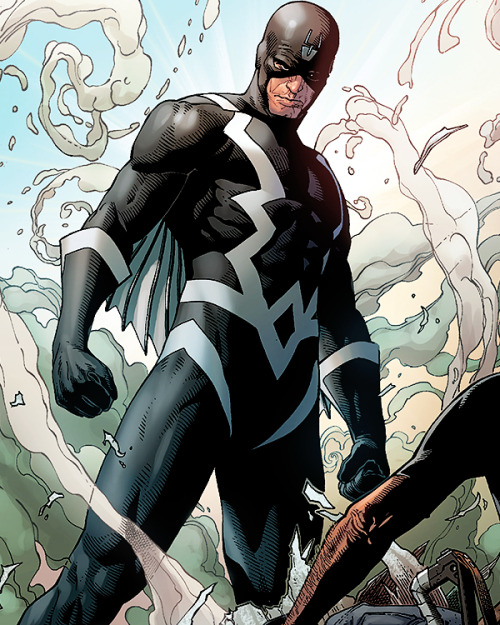
Black Bolt's first appearance established the character as being a member of the Inhuman ruling class.[4][5] The title Thor featured a back-up feature called "Tales of the Inhumans", which recounts the character's origin story. The son of King Agon and Queen Rynda, Black Bolt is exposed to the mutagenic Terrigen Mist while still an embryo, and eventually demonstrates the ability to manipulate electrons. To protect the Inhuman community from his devastating voice, Black Bolt is placed inside a sound-proof chamber and is tutored in the use of his powers. Reentering Inhuman society as a young man—having vowed never to speak—the character is attacked by his younger brother Maximus, who attempts, unsuccessfully, to goad him into speaking.[6]
Black Bolt proved popular, and decides to leave Attilan to explore the outside world.[7] The character reappears in a story focusing on his cousin Medusa,[8] drives off the Hulk after the monster defeats the entire Inhuman Royal Family (Medusa, Gorgon, Karnak, Triton, and Crystal),[9] and with the Fantastic Four, battles his brother Maximus and his own group of rogue Inhumans.[10]
1970sEdit
After being forced to intercede in the budding romance between his cousin Crystal and the Fantastic Four's Johnny Storm,[11] Black Bolt and the Inhumans feature in the title Amazing Adventures, and battle villains such as the Mandarin and Magneto.[12] A story in The Avengers, told in flashback, reveals how Black Bolt came to be ruler of the Inhumans and Maximus was driven mad. Black Bolt discovered his brother had secretly allied himself with the alien Kree—the race whose genetic experiments first created the Inhumans. In trying to stop an escaping Kree vessel, he overextended his sonic powers and caused the vessel to crash. The crash resulted in the deaths of several members of the Council of Genetics, including the brothers' parents, and Maximus was driven insane by his proximity to Black Bolt's use of his voice.[13] Black Bolt assumes the title of King but is haunted by the consequences of his actions.
Black Bolt settles a quarrel between Johnny Storm and the mutant Quicksilver for the affections of Crystal, and frees the slave caste of Inhuman society, the Alpha Primitives.[14] Black Bolt and the Royal Family aid the hero Spider-Man against the time-traveling villain Kang the Conqueror,[15] and is forced to again battle the Hulk,[16] teams with the Fantastic Four and the Avengers against the threat of the robot Ultron,[17] and again allies with the Fantastic Four against the fifth-dimensional villain Xemu.[18]
Black Bolt and the Inhumans feature in a self-titled bi-monthly series[19] battling threats such as the villain Blastaar and the Kree, who regard the Inhumans as abominations. The character encounters the immortal villain the Sphinx—who has defeated the Fantastic Four and the Royal Family blasting him into deep space,[20] aids Kree hero Captain Marvel in preventing a war between the Kree and Skrulls on Earth,[21] joins with Fantastic Four member the Thing to defeat the mutated villain Graviton,[22] and appears briefly during an announcement that Crystal is pregnant with Quicksilver's child.[23]
1980sEdit
Black Bolt revisits his origins when he, members of the Royal Family, and Fantastic Four members Mister Fantastic and the Thing battle the villain Maelstrom. Maelstrom is revealed to be the son of a rival of Black Bolt's father, and—after his minions are defeated—attempts to destroy Attilan with a guided missile. Black Bolt, however, manages to defuse the missile and Maelstrom is defeated.[24]
Black Bolt's search for a new site for the city of Attilan (eventually the Himalayas) is detailed in a back-up feature of the alternate universe title What If.[25] Another back-up feature in What If? details how Black Bolt worked with the Eternals to move the city of Attilan to the Himalayas.[26] Black Bolt also directed the eventual move of Attilan to the moon when the pollution on Earth became too much for the Inhumans.[27]
He is rated with other powerful Marvel characters by Spider-Man in an "out of universe" conversation with the reader.[28] He appears in a graphic novel detailing the eventual death of former ally Mar-Vell due to cancer,[29] He also appears in a one-shot publication featuring humorous parodies of the Marvel Universe - Fantastic Four Roast,[30] and aids superheroine Dazzler against the villain Absorbing Man.[31]
An alien device abandoned on the moon causes Black Bolt, the Royal Family, and the Fantastic Four to experience nightmares until destroyed by Triton.[32] Black Bolt is imprisoned by Maximus (who has also swapped their bodies), but he is freed by the Royal Family and the Avengers.[33] He appears in a one-shot title detailing several of Marvel's continuity mistakes.[34] He marries his cousin Medusa after an interrupting battle between a Kree and Skrull soldier.[35] He appears in another What If? issue[36] and a back-up tale in Marvel Fanfare.[37]
With the Royal Family, Black Bolt encounters Dazzler once again,[38] appears in flashbacks in two issues of The Avengers,[39] attempts to subdue an erratic Quicksilver (distraught over his wife's affair),[40] and aids the mutant team X-Factor in defeating Maximus.[41] The Inhumans then assist the Fantastic Four against the villain Diablo,[42] skirmish with a later version of the team during The Evolutionary War.[43] They also appear in the first issue of What If?'s second volume.[44]
Black Bolt clashes with Attilan's Genetic Council when they forbid the birth of the child he conceived with Medusa. She ends up fleeing to Earth to bear her son (Ahura).[45] Black Bolt destroys the alien symbiote that Spider-Man bonds with in another issue of What If?,[46] and with the Royal Family encounters the hero Daredevil.[47]
1990sEdit
After another appearance in a back-up feature in the title What If?[48] a story told in flashback reveals how Maximus, using a creation called the Trikon, forced Black Bolt from Attilan. Black Bolt, however, eventually defeats the Trikon and regains the throne.[49] After aiding the teen super group the New Warriors[50] the Royal Family joins forces with X-Factor to stop master villain Apocalypse.[51]
Black Bolt makes a series of brief guest appearances in several titles[52] and his child is threatened by rogue Inhumans. He and the Royal family break away from Attilan after rescuing his son from the corrupted Genetics Council.[53] After two more appearances in back-up features in the titles X-Factor[54] and Starblast,[55] Black Bolt appears in several panels in two titles[56] before starring in the one-shot publication Inhumans: The Great Refuge (May 1995), which details the Inhumans' ongoing battle with the Kree.
With the Royal Family, the Fantastic Four, and Doom's heir Kristoff Vernard, Black Bolt thwarts Morgan le Fay and Maximus again, battling Thor and Sub-Mariner in the process.[57][58] He appears with the Fantastic Four during the Onslaught crisis.[59] After appearing in the one-shot title Bug[60] Black Bolt and the Inhumans feature in the Heroes Reborn universe, where they worship the entity Galactus and his Heralds, as gods.[61]
The character encounters the noble savage Ka-Zar[62] and witnesses Quicksilver reunite with Crystal[63] before he and the Royal Family appear in a back-up feature in the Fantastic Four title.[64] Black Bolt and the Inhumans then feature in a self-titled limited series which deals with the "coming of age" of a new group of Inhumans and stopping Maximus, who with both human and Inhuman allies attempts to subvert his brother's rule.[65] After an appearance in the final issue of a Quicksilver limited series[66] Black Bolt and the Inhumans team with Canadian superteam Alpha Flight.[67]
2000sEdit
The character is featured—again with the Royal Family—in a third self-titled limited series that has major developments for the Inhumans. Ronan the Accuser leads the Kree in a surprise attack, capturing Attilan and forcing the Royal Family into service against Kree enemies the Shi'ar. Karnak, Gorgon, and Triton covertly join the Shi'ar Imperial Guard while Black Bolt and Medusa must attempt the assassination of the Shi'ar ruler Lilandra at a ceremony ratifying an alliance between the Shi'ar and the Spartoi. Although the attempt fails and Black Bolt manages to defeat Ronan in personal combat, the Inhuman people choose to leave with the Kree and pursue a new future. This leaves Black Bolt and the Royal Family alone to fend for themselves.[68]
Interdimensional adventurers the Exiles also encounter an alternate universe version of Black Bolt.[69] Black Bolt decides to attempt reintegration with Earth, and several younger Inhumans—recently exposed to the Terrigen Mists—explore Earth with mixed results, including at one stage the intervention of the Fantastic Four. The Inhumans resettle in the Blue Area of the Moon and begin to rebuild.[70] The character also appears briefly in the mutant title X-Statix[71] and a one-shot title, Inhumans 2099, speculates on the future of the Inhumans and their role on Earth.[72]
In the title New Avengers,[73] Black Bolt is revealed to be a member of a superhero council called the Illuminati. Via a retcon of Marvel continuity, the group form during the Kree-Skrull War[74] to deal with threats to Earth. During the "Son of M" storyline, the mutant Quicksilver steals a canister of Terrigen crystals from Attilan, with Black Bolt and the rest of the Royal Family attempting to retrieve it.[75]
Black Bolt also rejects the Superhuman Registration Act and refuses to become involved in the ensuing "Civil War." Courtesy of the hero Sentry, Black Bolt monitors the situation.[76] In the limited series Silent War, the US military attacks the Inhumans to prevent them from retrieving the crystals. Believing the stolen crystals should be returned to Attilan, Black Bolt issues a warning to the United States concerning further acts of aggression, and eventually launches an offensive against the nation. Gorgon and other Inhumans are captured during the attack, which prompts Black Bolt to personally head a team to rescue his subjects and retrieve the crystals. While the mission is successful, Maximus takes advantage of the situation and overthrows and temporarily incarcerates Black Bolt.[77]
The Illuminati also collect the Infinity Gems, and—to prevent the abuse of power by the Titan Thanos and others—split the gems between themselves, vowing that they never be used in unison again. Black Bolt is given the "Reality" gem.[78]
The character apparently suffers a setback when brutally beaten by the Hulk, on a rampage during the "World War Hulk" storyline and seeking revenge on Black Bolt for his role in the Hulk's exile from Earth.[79] During the events of the Secret Invasion limited series it is revealed that this was not in fact Black Bolt, but rather a Skrull, who is killed in battle by members of the Illuminati.[80][81] The true Black Bolt is captured by the Skrulls, who intended to use his voice as a weapon of mass destruction.[82] The character is rescued when the heroes of Earth defeat the Skrull army and discover the location of their captured teammates.[83]
Black Bolt, angered by the repercussions caused by the Skrull invasion, changes tactics and embarks on an aggressive campaign against all former persecutors of the Inhumans in the War of Kings limited series. At his command, the Inhumans attack the Kree and overthrow Ronan the Accuser, with Black Bolt declaring himself supreme ruler of the Kree Empire. This is followed by a preemptive strike from the Shi'ar empire, now controlled by the usurper Vulcan. Black Bolt intended to release the Terrigen Mist across the galaxy and end the war when, courtesy of the subsequent mutations, all are rendered equal, but the plan was interrupted by Vulcan, the two clashing as the bomb charged up. Although Vulcan was nearly killed by Black Bolt's voice, Black Bolt prepared to abandon his plan when Crystal pointed out that the powers produced by the explosion would only inspire more harm rather than good. However, an enraged Vulcan retained enough strength to stop Black Bolt from teleporting away with Crystal and Lockjaw, which resulted in Black Bolt and Vulcan apparently dying in the subsequent explosion of the Terrigen bomb, as Crystal only negated the Terrigen Mists within the bomb without shutting down its ability to explode.[84]
2010sEdit
He in fact survived the explosion. It was revealed that Black Bolt likely represents the anomaly of the Kree Inhuman genetics program that had been predicted hundreds of thousands of years ago. The genetic prophecy was that this anomaly would bring about the end of the Supreme Intelligence. To prevent this outcome, the Kree Supreme Intelligence had ordered the destruction of all the worlds where the genetic experiments took place. Only five colonies escaped, including Earth's: these were the Universal Inhumans. After his return to Attilan, Black Bolt joined the Universal Inhumans and was presented with four new brides, one from each of the other colonies.[85]
They returned to Earth to help defeat the last four Reeds of the Interdimensional Council.[86] They then faced the Kree Armada, who had been ordered by the resurrected Kree Supreme Intelligence to wipe out Earth and the Inhumans.[87][88] After the Kree fled in defeat, the Inhumans followed in pursuit.[89] Guided by Franklin Richards, Black Bolt confronted the Supreme Intelligence, surviving long enough to surrender and trigger protocols forcing terms of a truce. He convinced them that the prophecy has been broken, and that he was no longer a threat. They parted ways, but Black Bolt had to agree to Ronan (Crystal's husband) returning alone to the Kree domain.[90]
During the Infinity storyline, Black Bolt was visited by Thanos' Black Order in order to demand a tribute, the heads of Inhuman younglings between the ages of 16 and 22 or the annihilation of Earth's inhabitants. Using the Terrigen Codex, Black Bolt discovered Thanos used the tribute demand as a cover for his true mission: to kill his secret Inhuman-descendant son whose identity and location were unknown even by his father.[91] After the Inhumans denied the tribute to Corvus Glaive, Thanos personally visited Black Bolt in Attilan. Finding the Inhuman city empty with only Black Bolt left, Black Bolt unleashed a powerful scream which tore down Attilan itself and activated a Terrigen Bomb which spread the Mists across the Earth.[92] Thanos survived the attack and found Black Bolt still alive in the rubble. Thanos demanded to know the location of his son. Black Bolt refused and continued attacking Thanos with his voice until an enraged Thanos knocked him out.[93] Black Bolt was held captive for Thanos to use his power to activate the Illuminati's anti-matter bombs to destroy the Earth.[94] When the Illuminati arrived in the Necropolis, they found Thanos' general Supergiant, with Black Bolt under her control as she uses Black Bolt to defeat them. When Supergiant activated the bombs, Maximus appeared with the trigger. He triggered the bombs, but also used Lockjaw to transport the anti-matter bomb along with Supergiant to a distant uninhabited planet where she died in the explosion. Black Bolt was liberated and left the scene along with Maximus and Lockjaw. In the ancient location of Attilan in the Himalayas, Black Bolt hid the Terrigen Codex and made Maximus understand his survival and that of his brother were to be kept a secret. Maximus also deduced that Black Bolt was always going to activate the Terrigen Bomb irrespective of Thanos' arrival which was to herald a new age of the Inhumans.[95] After being examined by Maximus, Black Bolt discovered with his brother that the Terrigen Bomb had greatly diminished Black Bolt's powers. Black Bolt and Maximus agreed to keep this a secret.[96]
Using exogenetically charged waters, Maximus was able to help Black Bolt recover from the power loss he suffered after the detonation of the Terrigen Bomb.[97]
During the "Secret Wars" storyline, Black Bolt takes part in the incursion between Earth-616 and Earth-1610. He is taken out by the Children of Tomorrow.[98]
In the aftermath of the Secret Wars storyline, Medusa sends Nur and Auran to find Black Bolt who is forced by Maximus to use his voice against them, killing Auran.[99] Black Bolt and Medusa end up separating over his prolonged absence from Attilan.[100] Nonetheless, they team up to battle Kang the Conqueror for their son Ahura (Black Bolt had earlier given Ahura over to Kang for safe-keeping during the incursions). Unwelcome in Attilan, Black Bolt now runs the "Quiet Room," a nightclub that functions as a neutral zone for metahumans.[101] At one point, a resurrected Auran steals his voice, but it is restored with the help of Sterilon.[102]
During the "Death of X" storyline, Black Bolt is framed for the death of Cyclops.[103]
When the truce between the Inhumans and X-Men is broken during the Inhumans vs. X-Men storyline, Black Bolt is subsequently ambushed by Emma Frost and Dazzler in the Quiet Room. A disguised Dazzler is able to absorb the energy from his voice and counterattack him with it.[104] He is held captive by the X-Men in Forge's workshop in the dimension of Limbo until his rescue by Medusa and the Inhumans.[105] He helps Medusa neutralize Emma Frost. In the aftermath, there is hope of reconciliation between the Royal couple as she joins Black Bolt in the Quiet Room.[106]
Black Bolt and a group of Inhumans later tracked down Maximus and captured him for his trial. Black Bolt later spoke to Maximus privately.[107]
Marvel Boy later reveals that there is still hope to restore the Inhuman race on the remains of the Kree Homeworld, so the Royal family and a couple of new Inhumans journey to space to find the secret buried on Hala.[108]
However, they were soon confronted by two surprises: Medusa's affliction with a mysterious illness, and the revelation of Black Bolt as Maximus in disguise. Maximus had used his psychic powers and an image inducer to switch places with his brother before leaving Earth.[109] It was Black Bolt that was imprisoned in a deep space torture prison that was meant for Maximus. Upon defeating his fellow inmate Absorbing Man, Black Bolt confronted the as-yet-unidentified jailer. When his quasi-sonic no longer worked, Black Bolt was killed and revived.[110] Black Bolt later made acquaintances with Absorbing Man, Blinky, Metal Master, and Raava.[111] After discovering that the Jailer is an Inhuman who was incarcerated in the torture prison and has since taken over it, Black Bolt and his fellow inmates fight the Jailer. Absorbing Man sacrifices himself so that Black Bolt can kill the Jailer and enable his fellow inmates to escape.[112]
Black Bolt returns to Earth with Blinky. They inform Titania about her husband Crusher's heroic death.[113] At the funeral, Blinky is kidnapped by Lash.[114] He forces Black Bolt to surrender and injects him with a poison to prepare his blood to be used as part of a new Terrigen-type bomb that will produce new Inhumans. The pain of the process sends Black Bolt's mind towards Medusa's mind. They interact on a psychic plane and update each other. He finds out about Medusa's love for Gorgon and they determine that they cannot go back to their marriage. Instead, they will move forward and Medusa promises to find them as they get separated. Black Bolt breaks free only to succumb to the poison. Blinky tries to protect him, but turns into a monster channeling the Jailer.[115]
After an encounter with the Progenitors, Medusa and Black Bolt meet on the Astral Plane and agreed to continue as partners and not lovers. When Medusa takes the Primagen, it restores her hair and health while also causing a backlash in the attacking Progenitor to destroy the approaching Progenitors causing the Ordinator-Class Progenitors that saw the attack from the World Farm to spare Earth from their invasion.[116]
In the pages of "Death of the Inhumans," Black Bolt calls together the four Queens of the Universal Inhuman tribes to respond to this threat. However, the meeting goes far from as planned, as an Inhuman executioner named Vox, a Super-Inhuman created by the Kree, begins his bloody rampage across the place. When Black Bolt and his Royal Family reached the meeting place, they discover the bodies of Oola Udonta, Aladi Ko Eke, Onomi Whitemane and Goddess Ovoe, with the same three words written in their blood on a banner hanging about their corpses and eventually realized that they fell in to a trap as one of the dead Inhumans was wired with an explosive. While most of Black Bolt's group made it out alive, thanks to Lockjaw, Triton was not so lucky and was killed in the explosion. Black Bolt then sent Lockjaw to New Arctilan to retrieve his brother Maximus.[117] After Vox subdues Karnak, Black Bolt arrives where he walks through the halls of the Kree base speaking every name of the fallen Inhumans, making it a song about death. Eventually, it comes down to just Black Bolt and Vox who's holding Karnak as a shield. Black Bolt signs to Karnak to have Vox take him instead. Vox apparently accepts the change as he teleports himself behind Black Bolt. Before Karnak’s very eyes, Vox slits Black Bolt’s throat.[118] The Kree take Black Bolt prisoner and repair the damage done to his throat without using any sedatives or anesthesia to dull the pain which prompted them to think that Black Bolt's great power is gone when he doesn't scream and therefore the prophecy about the Midnight King is no longer a threat to the Kree. However while being transported, it turns out he still has his voice, but it's faint. After killing several Kree, Black Bolt secures a firearm and finds Ronan the Accuser alive. However, he is a prisoner of Vox and has been experimented on. At Ronan’s request, Black Bolt enables him a mercy killing.[119] The Inhuman Royal Family and Beta Ray Bill rescue Black Bolt from Vox. When Maximus was behind the mask of Vox, Black Bolt and the Inhuman Royal Family discover that Vox is not a Super-Inhuman and is just a Kree programming.[120] While recapping the deaths that Vox has caused, Black Bolt also recalls the prophecy of the Midnight King. Meeting up with the Inhuman Royal Family and Beta Ray Bill, Black Bolt is told by Karnak of Vox being a programming that transported his "victims" to the Kree. As Black Bolt has one more scream left, Karnak tells him to make it count. Using his sign language, Black Bolt addresses the others on how he has made mistakes in the past and apologizes to them. After holding a moment of silence, Black Bolt orders Gorgon to turn around. As Gorgon and Beta Ray Bill engage the Kree soldiers, Black Bolt, Medusa, and Lockjaw arrive at the laboratory where they find Vox-controlled Inhumans like Crystal and Lockjaw. Using a laser, Black Bolt clears the Vox-controlled Crystal and Lockjaw just because they were in his way. Entering one door, Black Bolt signs "I love you. I'm sorry" before whispering for them to run. As Medusa and Karnak fight the Vox-controlled Crystal and Lockjaw, Black Bolt confronts other Vox-controlled Inhumans like Triton. Knowing the truth about the prophecy, Black Bolt brings ruin to the Kree and unleashes his scream on the Vox-controlled Inhumans. This action frees Crystal and Lockjaw from Vox's control. Gorgon and Beta Ray Bill arrive stating that the Kree have fled and see Crystal and Lockjaw still alive. Black Bolt emerges from the room as Medusa orders Lockjaw to take them away from the Kree base. When Crystal asks where they should go, Black Bolt uses his sign language to say "home." Lockjaw then teleports them away.[121]
Black Bolt and other heroes die helping Dr. Strange fight Galactus, but all are resurrected after the battle is won.[122]
17 notes
·
View notes
Text
Seeker of the Sun Tribe Hierarchy Headcanon
While not officially recognized lore by Square Enix by any stretch of the imagination, this is my personal headcanon and what I use when addressing S’era Rarku’s own sect of the Zu Tribe.
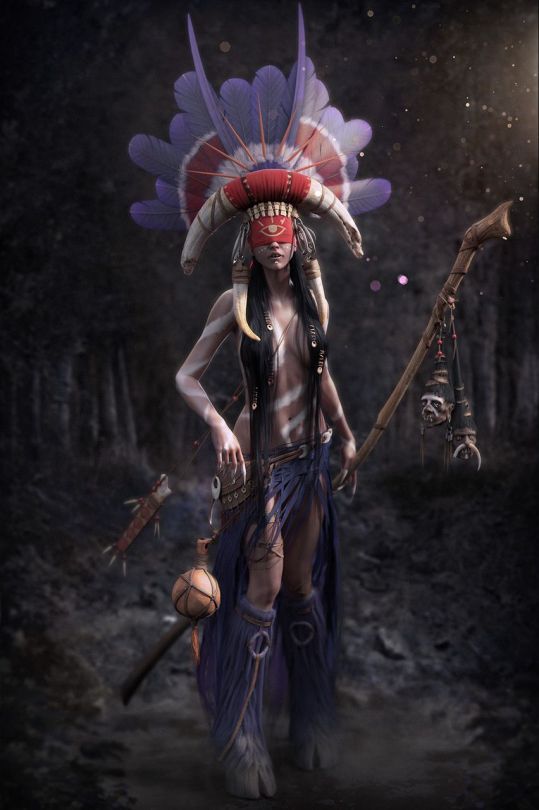

The Elders
The true leaders of the tribe. The Elders are the direct connection between the Miqo'te and the Goddess Azeyma, and serve as the religious pillar of the tribe. With the blessing of the Goddess herself, their word is not only law, but must be obeyed without question. They are responsible for the spiritual well being of their people, declaring the new Nuhn when a Tia is victorious in the duel, communing with the Goddess to carry out her will, and passing judgment on anyone who defies them. Offending or attacking an Elder is akin to spitting in the face of Azeyma; they must be treated with the utmost respect at all times. Only a Matron can ascend to this rank, and only if they are chosen by the Elders themselves.

The Nunh
The Nunh is the breeding male and the face of the tribe. He commands his harem of wives and is the last line of defense against invaders. Unofficially the leader of the tribe, he decides when and where the tribe migrates during the Summer Hunts (however the Elders may override his decision at any time for any reason). They can be challenged to a duel by Tia and must defend their title; a Nunh may refuse a challenger, but any sign of weakness may provoke banishment by the Elders. Ultimately they need to sire as many children as quickly as possible so their lineage may continue. Most Nunhs only live a few years before they are defeated. Only the strongest or most cunning Tia are capable of becoming a Nunh.
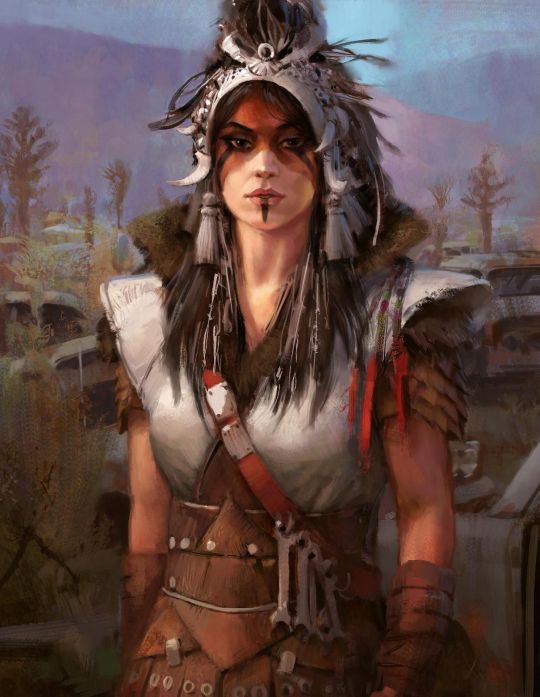
The Favored Wife
The main wife of the Nunh and alpha of his harem. A coveted and closely guarded title, she receives the most attention from the Nunh and is treated far better than the other wives. They get to eat first from every successful hunt, get first pick of any valuables claimed by the tribe, and hold power and authority over the other wives. Only the Nunh can decide who is the Favored Wife, and as a result, the competition for this title usually begins and ends in the bedroom.

The Matron
The end goal for every wife. A Matron is responsible for maintaining order within the tribe, deciding when a daughter is ready to be recognized as an adult, and deciding what role they will fall into: a warrior, a huntress, or a wife. In accordance with Azeyma's station among the pantheon, a wife is required to give birth to three daughters before they are eligible to ascend to the Matron stage. Unsurprisingly most Matrons are older women.
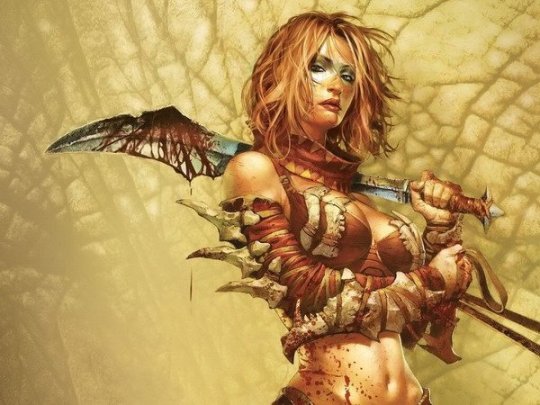
The Tribewives
The community pillar of the tribe, the tasks of the wives as important as they are numerous. They are responsible for pleasing their Nunh, birthing three daughters as quickly as possible, preparing the food from a hunt, raising their children, keeping the tribe grounds clean and tidy, patching up their Nunh after every duel, passing down the stories and songs to the next generation, and instilling virtues and wisdom in their daughters. If the tribe practices slavery, they are mainly responsible for easing the great burden on the tribewives' shoulders. The tribewives are also responsible for passing down the stories of old, as most tribes do not use a written language of any kind.

The Warriors
Savage, ruthless, fearless. The warrior women are devoted to keeping the tribe safe, and represent the martial pillar. They roam the territory and ambush unsuspecting trespassers, perform raids on trade caravans, and coordinate the resistance of an invading force. Usually they will capture or kill any outsider they come across, and bring anything of value back to the matrons. Proud and ferocious, the warriors often ritually scar themselves in addition to tattoos and body paint.
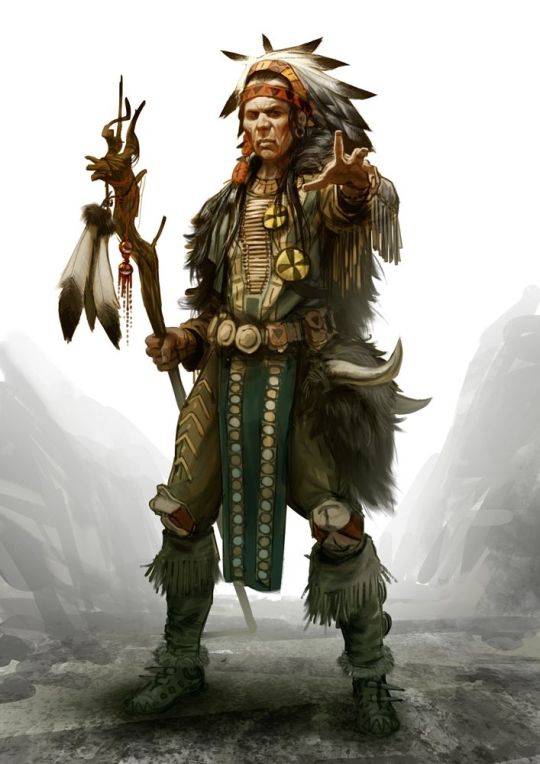
The Huntresses
These hunter-gatherers are solely responsible for keeping the tribe fed. They will routinely conduct Great Hunts where they will go forth, sometimes beyond their own territory, in pursuit of large and often dangerous animals. They will assist the warriors in times of conflict, serving as scouts in warfare and sentries outside of direct battles. Each huntress must be cunning and swift, and in peak physical condition; persistence hunting is a popular tactic in catching prey, and is used by most tribes throughout Eorzea.
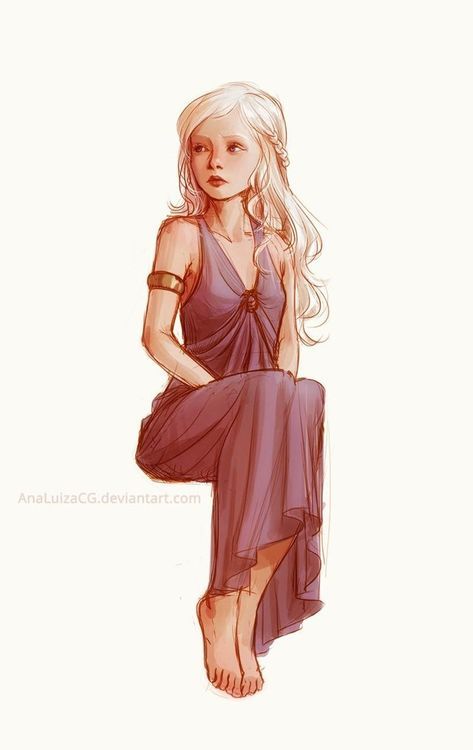
The Tia Keeper
A rare responsibility given to infertile women, retired and shamed warriors, or even to malformed adult Tia too weak or frail to leave the tribe. They are tasked with raising the Tia, so they can one day leave the tribe and become Nunhs of their own. There is no glory, prestige, or even respect given to the Tia Keeper, and they are all too often ill-suited for raising rowdy boys. As a result, few tribes entertain the idea of a single person raising them; for most tribes Tia are simply kept in the background and raised by their fathers until the Nunh is defeated, where they are subsequently released into the wilderness, regardless of their age.
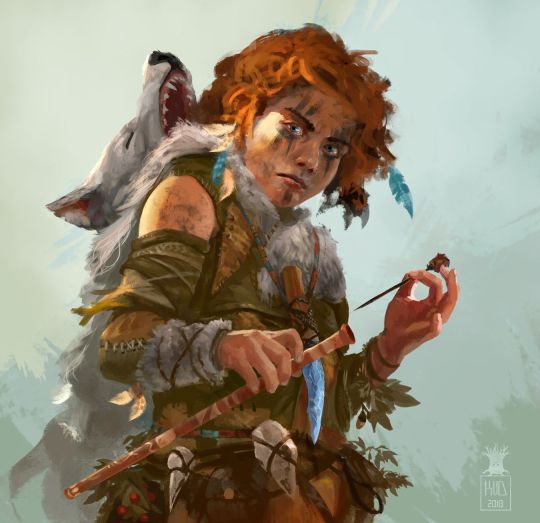
The Kittens (Daughters)
The lifeblood of any Miqo’te tribe, and their most valuable resource. All daughters are fed alongside the Nunh and Favored Wife, fiercely protected by every adult in the tribe, and carefully guarded by their mothers and the Nunh himself. At their tenth summer a ceremony is held to celebrate their place in the tribe, and to be given a role by the Matron; due to the specific dynamic of new Nunhs and his harem, the young girls are born in waves with their birthdays typically clustered within a moon or two, making ceremonies easier to manage. If they are assigned to the Warrior caste, they are expected to begin training with various weapons every single day until they’re old enough to officially join them. If they are to be Huntresses, they are taken out into the wilderness with their aunts to learn the ways of the wild. If they are chosen to be wives, it is customary for the tribewives to teach them how to properly wash and repair clothing, set up and tear down tents, forage for edible nuts and berries, and take care of younger siblings.
The Tia
Easily the most neglected and irrelevant group of any tribe. The purpose of a Tia is to one day leave and become Nunhs themselves, or die trying, so their value and importance to their home tribe is virtually worthless. They do not count towards a wife’s journey to become Matrons, so they are treated as a waste of a painful birth. Showing them love and affection can only soften them for their perilous duty, so their mothers are not only expected to dislike them once they’re too old to be breastfed, but actively encouraged to do so. Only the Nunh will show them any sort of affection, and only their blood-related fathers. This hostile and often abusive way of life brings a whole host of psychological problems, creating emotionally deadened children expected to become coldblooded and ruthless killers. Most Tia never make it to their fifteenth summer, either dying out in the wilderness from all sorts of dangers, or dying at the hands of the Nunh they challenged. Coincidentally, Tia out in the wild will form groups called clowders to increase their chances of survival; roving clowders are hierarchical in nature, mimicking the fundamental structures of the tribes they left behind. A Tia’s life is suffering, with only a handful ever escaping the violent cycle of their people’s traditions.
6 notes
·
View notes